#and meta posts get LONGE
Text
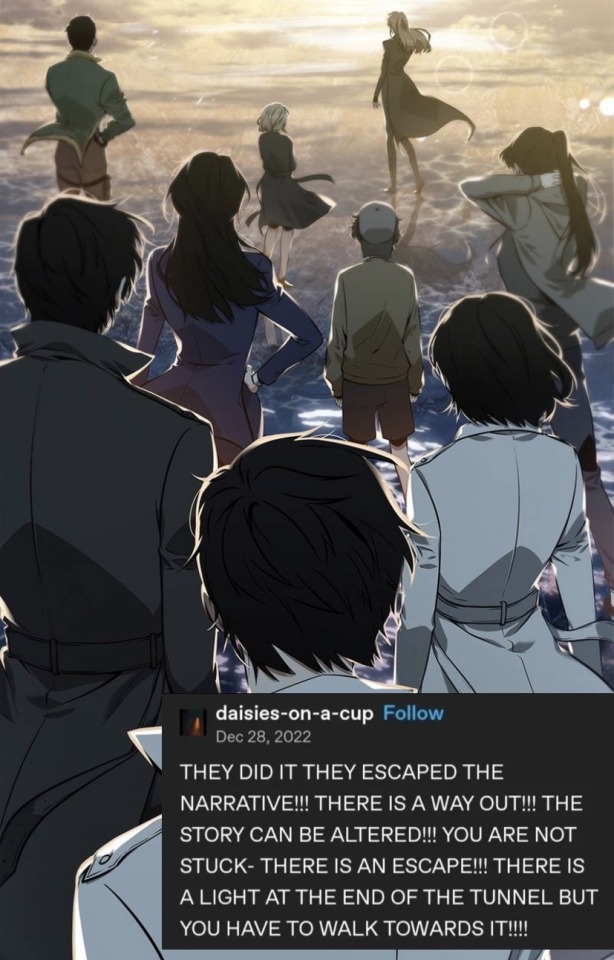
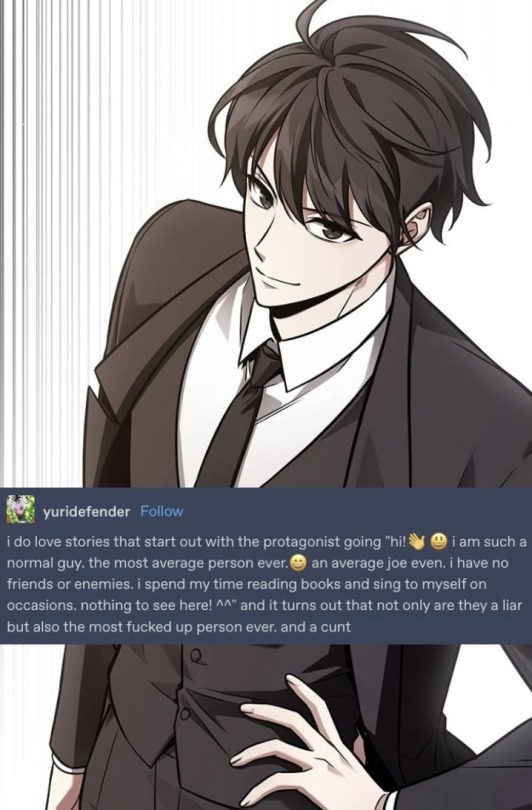
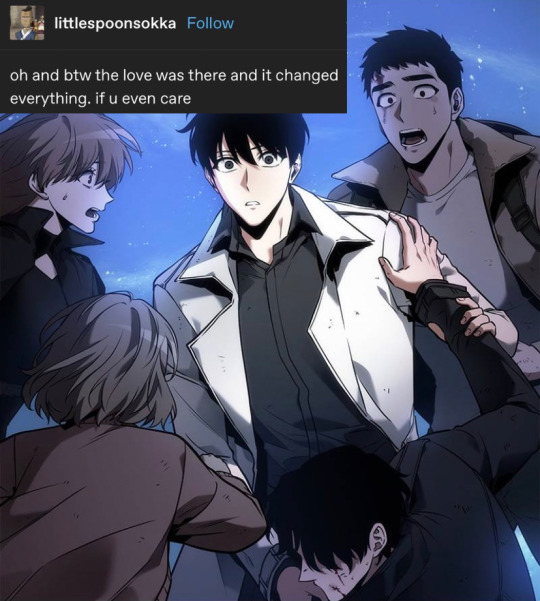
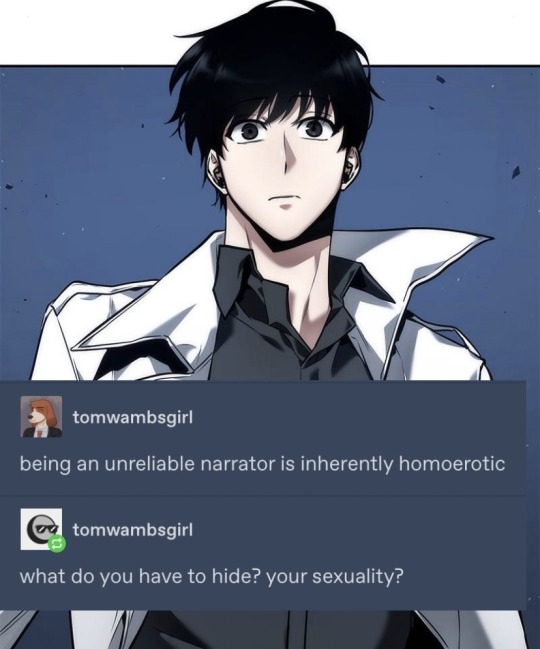
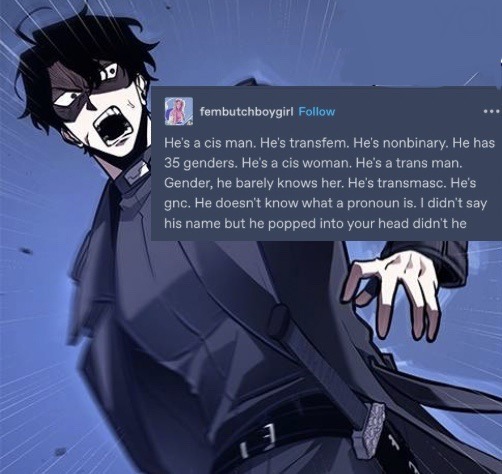
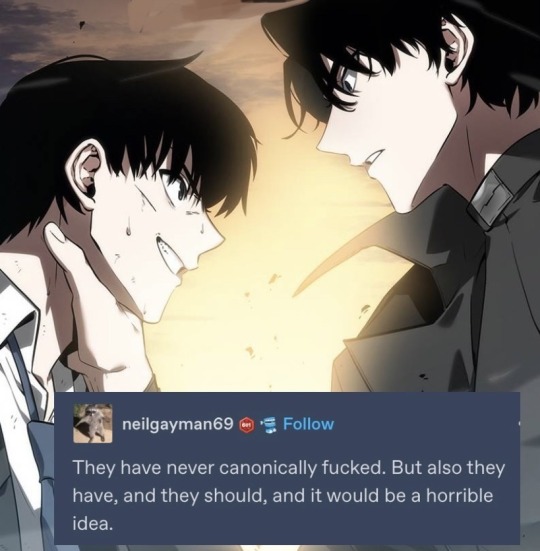
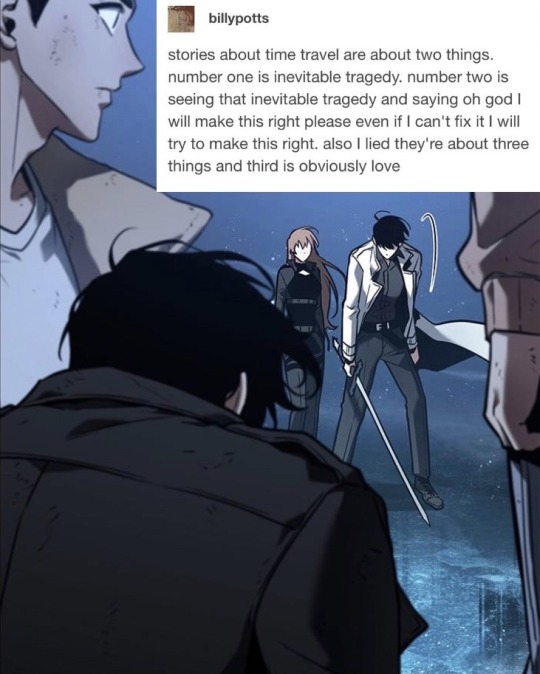

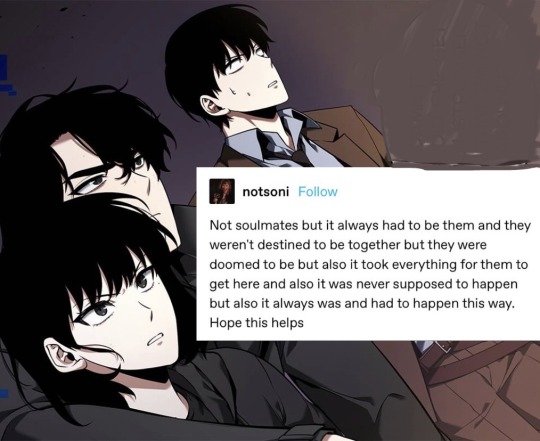
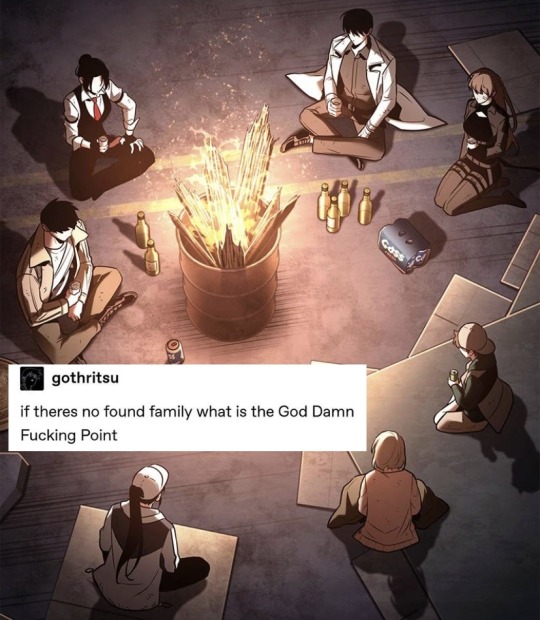
ORV as textposts 39/???
[Photo ID - 10 images from the Omniscient Reader's Viewpoint manhwa with Tumblr posts pasted upon them.
The first image shows the backs of nine members of the main cast as they look toward the sun in the background. The text post is by Tumblr user daisies-on-a-cup and reads, "THEY DID IT THEY ESCAPED THE NARRATIVE!!! THERE IS A WAY OUT!!! THE STORY CAN BE ALTERED!!! YOU ARE NOT STUCK-THERE IS AN ESCAPE!!!! THERE IS A LIGHT AT THE END OF THE TUNNEL BUT YOU HAVE TO WALK TOWARDS IT!!!!"
The second image shows Kim Dokja in a suit with his hand on his hip. The text post is by Tumblr user yuridefender and reads, "i do love stories that start out with the protagonist going "hi! 👋😀 i am such a normal guy. the most average person ever. 😄 an average joe even. i have no friends or enemies. i spend my time reading books and sing to myself on occasions. nothing to see here! ^^" and it turns out that not only are they a liar but also the most fucked up person ever. and a cunt"
The third image shows Kim Dokja with a shocked face. Yoo Joonghyuk is clutching Kim Dokja's shoulder as he falls. Lee Hyungsung is behind Kim Dokja on the viewer's right, and Yoo Sangah and Shin Yoosung are running toward Kim Dokja and Yoo Joonghyuk from the viewer's left. The text post is by Tumblr user littlespoonsokka and reads "oh and btw the love was there and it changed everything. if u even care"
The fourth image shows Kim Dokja. The text post is by Tumblr user tomwambsgirl and reads, "being an unreliable narrator is inherently homoerotic". They reblogged with an addition that reads, "what do you have to hide? your sexuality?"
The fifth image shows Yoo Joonghyuk yelling dramatically. The text post is by Tumblr user fembutchboygirl and reads, "He's a cis man. He's transfem. He's nonbinary. He has 35 genders. He's a cis woman. He's a trans man. Gender, he barely knows her. He's transmasc. He's gnc. He doesn't know what a pronoun is. I didn t say his name but he popped into your head didn't he"
The sixth image shows Yoo Joonghyuk staring at Kim Dokja while he holds him by the throat. Kim Dokja is slightly beaten up and smirking back at him. The text post is by Tumblr user neilgayman69 and reads, "They have never canonically fucked. But also they have, and they should, and it would be a horrible idea."
The seventh image has Yoo Joonghyk hunched over in the foreground with Lee Hyungsung to his left and Shin Yoosung to his right. Kim Dokja is in the background with Yoo Sangah on his right and the viewer's left. He's facing Yoo Joonghyuk and the viewer slightly and is hunched over with a sword in his hand. The text post is by Tumblr user billypotts and reads, "stories about time travel are about two things. number one is inevitable tragedy. number two is seeing that inevitable tragedy and saying oh god I will make this right please even if I can't fix it I will try to make this right. also I lied they're about three things and third is obviously love"
The eighth image is a close-up of Kim Dokja with smile and dull eyes against a black background. The text post is by Tumblr user raylangivins and reads, "I love a character who's like "I know exactly who I am and I'm being very authentic about it" and then when you analyse his behaviour even a little bit you realise his self perception is completely selective and delusional."
The ninth image shows Han Sooyoung, Yoo Joonghyuk, and Kim Dokja. Yoo Joonghyuk is leaned over Han Sooyoung's back while Kim Dokja is slightly off to the viewer's right with a confused expression. The text post is by Tumblr user notsoni and reads, "Not soulmates but it always had to be them and they weren't destined to be together but they were doomed to be but also it took everything for them to get here and also it was never supposed to happen but also it always was and had to happen this way. Hope this helps"
The final image shows the members of Kimcom sitting around a garbage-can fire with drinks. The text post is by Tumblr user gothritsu and reads, "if theres no found family what is the God Damn Fucking Point". /End ID]
ID by @incorrect-web-novels tysm!!!
#listen these ones are all long all at once and I apologize#but I try to group them by VIBE#and these are all meta posts ya know#and meta posts get LONGE#so here we are#orv#omniscient reader's viewpoint#omniscent reader#omniscient reader webtoon#omniscient reader novel#orv spoilers#just in case!!#orv novel spoilers#orv novel#kim dokja#kimcom#dokhyuk#yoohankim#yoo joonghyuk
1K notes
·
View notes
Text
i'm surprised i haven't seen any text posts yet about the Unsubtle Differences between astarion’s tiefling party/high approval forest scene and the one you get after the goblin party.
there’s something so terribly interesting about how the conversation afterward plays out depending on which variation you pursue.
like, most people have seen the tiefling party version by now. astarion basking in the sunlight the morning after, playing off most of what tav says with relative ease, even when they ask about his scars and he tells them about cazador. his cadence is smooth and composed, his smile almost friendly, even though you know, as the viewer, he’s playing a game of manipulation at this point. the only real crack in his demeanor is if tav notices that cazador’s “poem” was written in infernal, which, understandably, startles him.
but recently i watched the goblin party version of this same scene, and everything reads so differently. unlike at the tiefling party, it’s still the middle of the night when astarion tries to leave, thinking tav is asleep—almost immediately after the act, in fact. when tav does speak to him, he’s visibly nervous, halting and stammering in the middle of lines delivered unflinchingly in the other version of the scene. he gestures broadly and fidgets more while talking, his smile comes and goes. there’s even some of his distinctive high pitched, fake laughter sprinkled throughout the exchange, almost identical to later scenes where he's very, very obviously uncomfortable (like if raphael mocks him and magics off astarion's shirt to show the party his scars in act 2, or when confronting the gur children in their cell in act 3, etc etc).
siding with the goblins represents something deeply familiar to astarion, a level of cruelty he's more than familiar with and embraces likely because cruelty and duplicity, to him, go hand-in-hand with the power and freedom he craves so badly—but he won't stay the night with this tav, even if he approves of their actions. no, in this case, he'll keep to what's familiar and attempt to leave them in the forest under the cover of the very same darkness he resents having been cast into by cazador. when he gets caught, it sets him on edge, and everything he says becomes such a blatant lie to save face that tav would have to be completely oblivious not to see through him, or maybe just not care enough to.
but if tav saves the refugees? challenges his worldview and comes out victorious? oh, he'll complain of the poor rewards for his trouble at the party and whine about it being boring, but he decides to stay with tav through the night while they're asleep and on past dawn. he takes a moment to enjoy the morning sunlight, returned to his life after two centuries without. the same is true if you have high enough approval that he asks before the party, in which case, you've almost certainly hit his biggest approval gains: trusting him and supporting his safety. maybe he doesn't trip over his words when he speaks because, well, maybe this is someone he doesn't have to worry about. someone who's already more than proven themselves a foolish, heroic sort with a bleeding heart or otherwise demonstrated that they're already in his corner. in other words, not a threat—at least not to him.
does any of this make sense. i wanna study this guy under a microscope.
#the text may be the same but the line delivery is so enormously different it HAS to mean something idk! idk!#what he knows best but doesn't quite trust vs what's new but seems almost safe seems like the differentiating factor honestly#at least in whether he decides to leave tav immediately or stay with them till morning#which in turn affects how he feels by the time tav speaks to him#not to rag on the goblin route but man#he seems. well. frantic when he gets caught trying to leave asap.#to the point where listening to him feels... pretty bad imo#i'd love to know if it changes his romance later on because that seems like. well. a rough start#astarion#astarion bg3#astarion ancunin#bg3 spoilers#baldur's gate 3#bg3 meta#sort of idk#long post
2K notes
·
View notes
Text
one of my favorite things about mdzs is that for how heavily its plot involves politics of classism and misogyny... even the characters most directly impacted by it can't and don't free themselves from it. literally the closest exception is mianmian.
meng yao being the "son of a whore" wasn't some sort of commie awakening for him that led him to wanting everyone to be socially equal. he played the political game, climbed the ladders, sucked up to and backstabbed and murdered people, including other prostitutes who actually had nothing to do with how he and his mother were treated at the brothel he grew up in.
he put in so much extra excessive effort for even a fraction of the same respect that members of gentry cultivation clans got. and he did deserve to be treated more humanely! but he feeds into the exact same system that created him, leading to his own undoing.
his efforts were for a fragile upward mobility that was never going to hold up. he never surpassed his origins nor did he empower others in similar stations, because the society he lives in is not one that would accept that.
the second he got caught and all those crimes exposed, he was scapegoated to hell and back, replacing wei wuxian as society's terrible one-sidedly evil boogeyman overnight.
speaking of not-quite male gentry, i think it's interesting that wei wuxian explicitly doesn't try to climb the ladders in BOTH lives, knowing full well that anything he does will be punished just for the sheer fact that he is wei wuxian.
wei wuxian is scolded for giving intelligent and correct answers in school. lan wangji does the same and is praised.
wei wuxian occasionally lounges around with fellow disciples and is punished. jiang cheng does the same and mostly escapes.
wei wuxian refuses to carry his sword around in public (after losing his golden core, which nobody knows) and is scorned as an arrogant upstart. nie huaisang has been doing the EXACT SAME THING for YEARS and nobody bats an eye.
unlike jin guangyao, wei wuxian knew subconsciously from the start that his acceptance was superficial and that he could be cast out any time. when he was 10 and recently taken in by the jiangs, he canonically would not eat or use "too much" food and water because he thought they'd find him a nuisance for "wasting their things" and kick him back out.
now away from just the classism, yu ziyuan is a proud and strong noblewoman in a society that belittles and derides women for everything they do. her strong cultivation doesn't matter. she's victim to the vicious rumors of her husband loving another woman who is strong like her but apparently had a more likeable personality.
it doesn't matter even if jiang fengmian didn't cheat or that wei wuxian is wei changze's son with cangse sanren; yu ziyuan can't bear with the humiliation of herself (and by extension her children) not being "good enough". she's ridiculed for "failing" in that one duty as a wife, mother, and woman.
she lashes out and takes out that anger on everyone present for years, giving her children lasting trauma and also being a key element in how the jiang family and yunmeng jiang sect are effectively wiped out at the hands of the wen clan.
madam jin doesn't even have a name outside of the fact that she's married to jin guangshan. i don't even remember reading anything that indicates if she's a strong or weak cultivator, or what, which in itself proves that to most people, it doesn't matter. she's "just" a woman.
of course she's angry at her husband's affairs and all the bastard children they bring in. but she also can't do anything about them, so she lashes out at the few people she can: servants. non-cultivators, probably. those very same bastard children.
shoutout to meng yao getting shoved down a flight of stairs at age fourteen, because if madam jin tried that move against her husband instead, it would make her lose even more face, which as a noblewoman she'd never do.
and that's not getting into how jiang yanli is consistently sidelined for being physically weak.
that's not getting into how mianmian was actually a good cultivator, but was mocked by everyone around her for trying to stand up for wei wuxian when everyone was turning on him. how everyone scoffed at luo qingyang's words as "just some lovesick woman" who "obviously wants to marry or bed him since he saved her".
luo qingyang is the only one of these characters who HASN'T died. she didn't play society's games like jin guangyao. she didn't dig her heels in confidence of her own abilities like wei wuxian.
she didn't bitterly lash out like yu ziyuan and madam jin. she didn't gently accept it like jiang yanli.
she just LEFT.
she married an ordinary merchant and cultivates separately from mainstream cultivation society, and therein found her own peace and happiness.
mxtx doesn't bother with particularly class conscious or feminist vocabulary to hand-hold readers into understanding these disparities, but that choice highlights them & the deeply entrenched politics of their society even more. i really love it.
#keri chats#mdzs#mo dao zu shi#long post#mdzs spoilers#im novel only but still tagging.#the untamed#cql#yeah yeah everyone's written meta addressing this aspect of the story BUT I THINK ABOUT IT ALL THE TIMEEEEE#maybe i just don't get to read a ton of books often; esp not ones that mirror my own culture. but it's just so. soooooo. augh#the fact that the setting itself enables so much of the tragedy in mdzs... which is true of all tragedies but STILL...#this isn't even getting into qin su and the power imbalance w her and jgy post-reveal... man.#man. so much going on here. man#THIS POST IS MESSY AND BARELY EDITED BUT IF U READ IT. ILU
502 notes
·
View notes
Text
Some thoughts on Lucifer's mental health, relationships, and role as king of hell!

Lucifer’s perception of himself as the king of hell is really interesting to me because he’s very blase about it in canon while totally using it when it suits him.
I think it’s really telling that the first time he actually brings it up himself is when it’s something he can leverage to help Charlie out. He reads to me like someone who objectively knows that he’s the hottest shit in town, but also just doesn’t really think that it matters most of the time because it's not relevant to his personal problems. Being Lucifer Morningstar did not allow him to achieve his goals in petitioning heaven. Being the most powerful person in hell didn’t even un-fuck his family life!
...Except for when suddenly it might in fact help un-fuck his relationship with his daughter.
It's the main thing he can desperately and dramatically showcase as a worthwhile reason for Charlie to maintain a relationship with him, because he as a person is depressed, half-functional, and barely has enough spoons to pay attention to a conversation he's having with her while he's actively having it, nevermind remembering their last one.
He wants to! And it doesn't start with his song at the hotel! It starts with him answering the phone, heavily fumbling actually connecting with Charlie despite clearly desperately wanting to, and then realizing she's asking him for something and promptly choking on his tea before excitedly telling her, "Yeah! Of course! Anything within my power is yours for the asking, you just name it." He knows that there is a great deal 'within his power,' and he's happy and relieved that he can offer her that!
Lilith has been gone for years but he's still wearing his wedding ring. His walls are still covered in family portraits. He's just been sitting in his room making thousands of rubber ducks he thinks suck instead of ruling hell, because his daughter liked that one duck he made one time.
Charlie needed him to support her in her mission, but damn did Lucifer also need Charlie to get him out and moving and actually doing things again.
Anyway, someone get this man on an SSRI.
#hazbin hotel#hazbin lucifer#lucifer magne#lucifer morningstar#meta#personal#text posts#long post#expanding on some comments I made about him in an ask!#can't WAIT to find out what his and Lilith's deal is#my funky little depressed king#Alastor took him not knowing who he was personally#but after his comments about watching TV and not remembering Charlie's hotel#I think it's pretty clear Lucifer is just out of touch as hell because he hasn't got the spoons to function like people think he would#ETA: I tried to write a little rambling meta post failed to get my feelings out and now I'm 3k words into a fic#I NEED TO JUST REMEMBER THAT FIC COMMUNICATES MY FEELINGS BETTER..........
711 notes
·
View notes
Text
Every once in a while I think again about the end of Thriller Bark and feel completely insane and ill about Zoro's sacrifice, FOR LUFFY, specifically (you know, the character Kuma's threat was directed at). It wasn't even that long into traveling together, a few months maybe, yet Zoro was ready to give up everything in that moment - in the chapter with Kuma appearing being titled The End of the Dream ! - to protect his crew and Luffy, so he could continue in his journey.
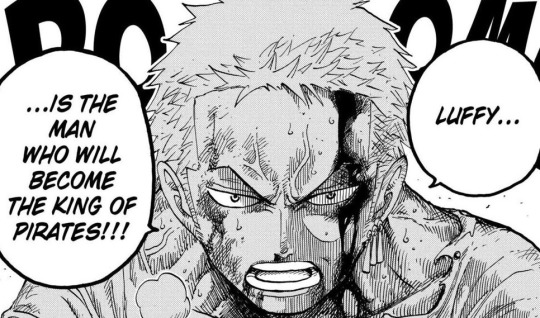
Since Luffy and Zoro met, they always understand how words and promises were imporant to them - with Luffy punching Helmeppo in ch. 3 for lying to Zoro. Zoro learnt how serious Luffy was about his dream, and soon he realized he backed up his words with actions as well - untiying Zoro and giving him his swords back - his biggest treasures. It meant that Zoro could be honest and honor-bound in the same way to Luffy, to gain this mutual respect and trust between them since day 1. To wield his swords to protect both Luffy and later their whole crew, and to step in a way between Luffy and danger.
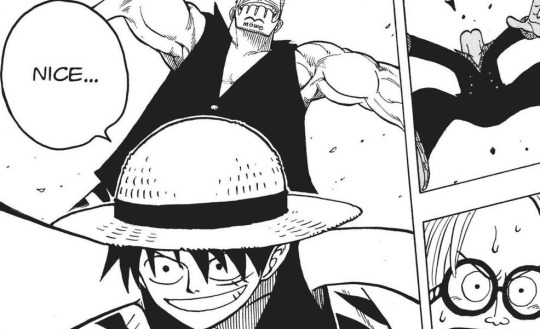
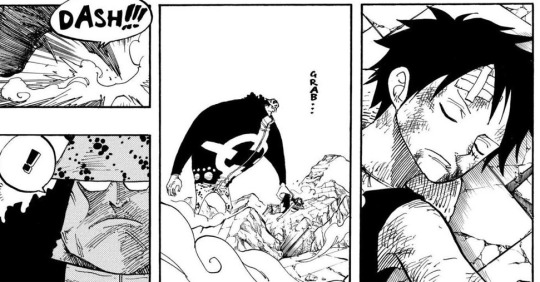
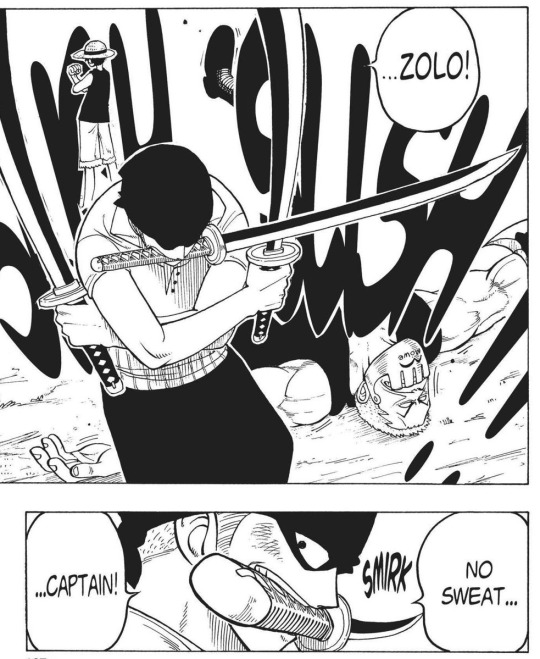
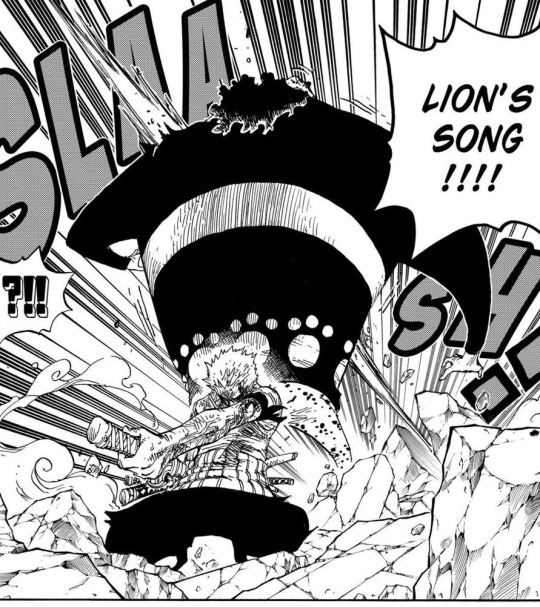
He was being actually more upset that Sanji got up from the previous Kuma's attack and interrupted their fight - Zoro was trying to keep the whole crew safe by this exchange for Luffy's head - if Sanji was offering his life for Luffy half dead and without much strength left to fight for himself (he started the offering of his own life already believing he woudn't survive, with a "you should find a new cook"), then this very specific sacrifice would be meaningless to the crew (- if this arc was taking place post WCI, then it would turn out very differently, with the strength of Sanji believing in Luffy, but it wasn't his moment during this scene) - it would hurt them more than help them, because as much as Zoro was prepared to die as well, he was prepared to keep fighting until the last breath.
Zoro was thinking he might die - Kuma's words were pretty certain he WOULD die - but he still had the willingness and strength to take on the deal for Luffy, for his captain and his crew. ("if i die here, it just means I wasn't worth much to begin with" this line he says times and times again during the overall story, like in Rogue Town throwing Kitetsu and waiting if it would cut off his arm, up until standing against King in Wano "it's my power that was lacking", and all the other times he was questioning his worth - it's something he tempts the fates he doesn't believe in, to actually harm him, to take his strength away if he doesn't deserve to survive. and it's him saying he knows and accepts his own weaknesses - of not being strong enough (in comparison to Sanji in this example), and always fights through them.)
He threw away his swords, including Wado Ichimonji - literally throwing aside his and Kuina's dream, to compell Kuma into a duel (with the anime playing 'The Very Very Very Strongest' when Zoro bowed down and pleaded Kuma, offering him his head instead of Luffy's) so Kuma wouldn't go after the crew and specifically Luffy later - no matter the outcome if Zoro would surive or not.
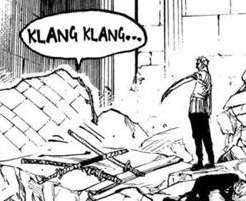
And then, he was actually strong enough to survive taking his captain's fatigue, agony and pain! Possibly being the only one who could survive taking Luffy's pain.
Zoro could have back out when Kuma offered him the 'taste' of the pain, with the realization of the scale of the hurt with the very possibility of dying from it. But that wouldn't be Zoro now, would it? He accepted and took all of Luffy's pain so his captain wouldn't have to suffer or die, and when they found him afterwards, he still kept standing, tense with the fatigue but alive! (again, with anime adding the music of 'Luffy's Fierce Attack' to underline the importance between these two).
He was training for this since the beginning - to become stronger to shoulder the pain of his crew if necessary. (And not only that - he was preparing for that so another Kuina incident didn't have to happen). He was the first one to fight one of the Warlords before anything really began: his fight with Mihawk at Baratie really set the tone and his own goals to overcome - a glimpse to see on how much different levels the Warlords actually were in comparison to Zoro, Luffy and the others, and if they were supposed to beat them so Luffy could become the Pirate King, that always meant to be ready and to get even stronger than them.
(small spoiler for egghead, ch. 1102: seeing Kuma (a Warlord at that time) remembering this Thriller Bark event later, during Egghead arc, and thinking that even he might have passed out from the pain, makes it all the more meaningful that it was Zoro who took the pain and withstood it - establishing how high was the strength of his willpower, already before timeskip.)
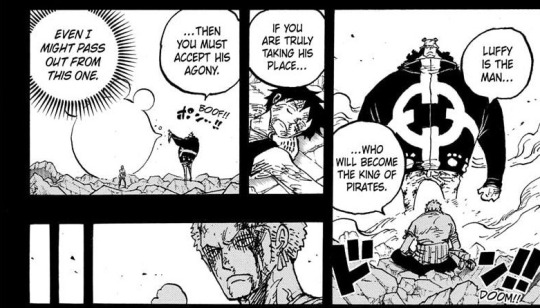
There could be so many other nuances and details from these last few chapters of this arc, and even what this deal meant for the following arcs! Zoro was still in pain on Sabaody, and because of that the crew wasn't as strong as it could have been (not to say they would have a chance anyway, knowing what all was in the motion).
The next is the tragedy and beauty of LUFFY never finding out about this. Half of the crew knew: Sanji, Brook and Robin knew the details, but would never tell Luffy - and that shows their loyalty to both Luffy and Zoro (and Zoro's decision). Luffy woke up and first thing he did was to jump up and down, excited not to be weighted down by his injuries, and only seeing his swordsman being down with injuries so severe he was out more days afterwards, knowing that something else attacked them (him = Zoro), after he was passed out from the fight against Moria, brought down his mood (even if it's not much noticable, but the change into subtle worry is there in the few next chapters).
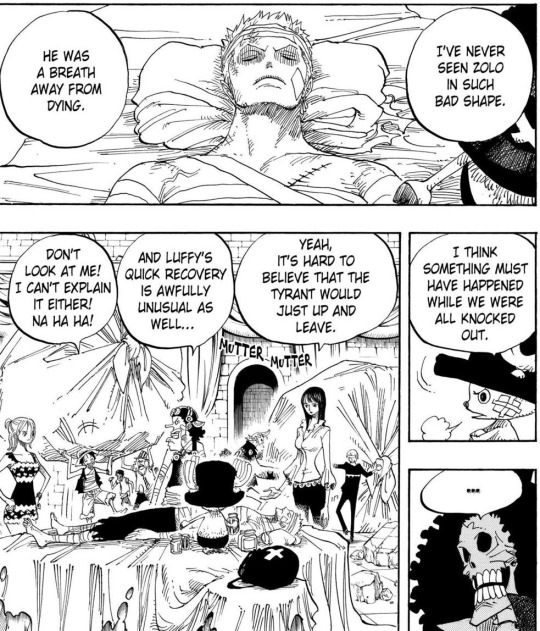
"I can't explain it either!" - meaning he was thinking about it too, possibly how weird it was for him to move normally after such long fight. We don't really ever hear/see Luffy thinking about something, except when it's mentioned how he came up with a solution or idea, telling us there's more to Luffy than just being straightforward in his goals and speech. With Luffy being sometimes very emotionally intelligent when he wants to be, he could have figured it out from all these other people in the room asking similar questions and deducing. Even Usopp was putting two and two togehter. We might never find out if Luffy actuallly knows or not. Luffy probably wouldn't ask Zoro directly, especially if Zoro wouldn't tell first and didn't want to talk about it
- because for Zoro, nothing happened! Nothing, that would compromise his and Luffy's first promise. For Zoro to become the Strongest he couldn't back down from the duel with Kuma (just like before with his duel with Mihawk at Baratie. When he's faced with something he swore to overcome, he can't back down or evade. Even back then Luffy understood that as he held back Johnny and Yosaku, but Sanji was perplexed how far Zoro (and Luffy) would go to reach their dreams). When Sanji was asking him in front of Kuma "What about your dream?" Zoro was still thinking about his dream- it was just that the context has changed, it changed into a journey. His dream is the most important thing, but it wouldn't mean much, if, when on his way to accomplish that, he would betray his other words and promises.
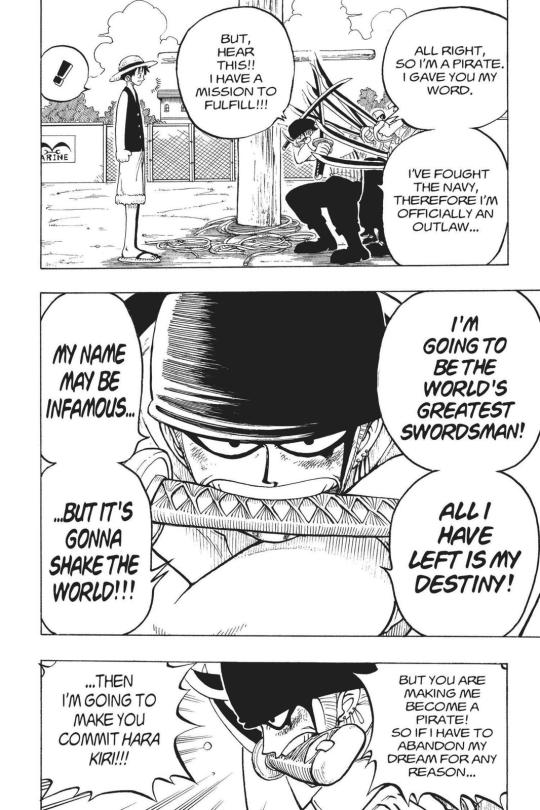
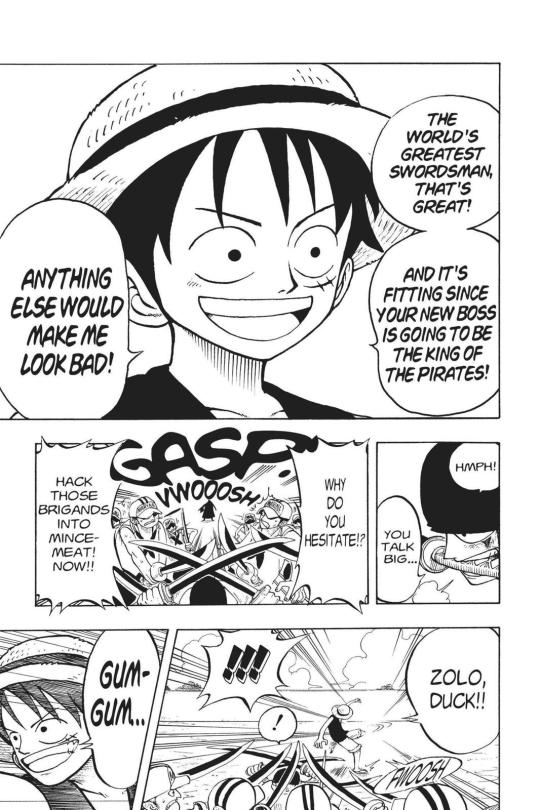
#I will never get over how this very important “nothing” happened!#the first draft of this was just a shitpost with one block of text. but it seems im incapable of not adding more and more on top of it#one piece#roronoa zoro#gif:op meta#monkey d luffy#monkey d. luffy#thriller bark#zolu#luzo#kuma#bartholomew kuma#mine#gif:op manga#one piece meta#gif:zolu#one piece analysis#everytime i go into the thiller bark tag and see posts blocked bc of the other ship. i take 10points of damage ://#can we talk about how this was zoro's deal for luffy? can we? i know theres posts about it. i made few too. but theres still not enough....#for how this moment was big. for how kuma had a memory of it even in egghead. and zoro was the only present one there (after the ursa shock#insane and ill about it yeahh never gonna shut up about zolu thriller bark#luffy one piece#zoro one piece#long post
341 notes
·
View notes
Text
We all already know Mizu and Akemi are narrative foils. But you know what? Lemme just say it, here's what I think:
Taigen and Mikio are foils.
Not necessarily to each other as individuals in the way that Mizu and Akemi juxtapose each other, but mostly in the contrast between their relationships with Mizu.
I've covered specific parallels between Taigen and Mikio in other posts I wrote; but as the number of parallels I'm noticing between them keeps piling up, I'm compelled to just compile them all in one post. So! This is, thus, the post in question.
First of all, let's look at their similarities.
1. Their status in society is the same. They are both samurai who lost their honour and have dreams of reclaiming it.
2. They are also both diligent as they strive to achieve this goal, they both care deeply about their work, but here as they begin to contrast, as the work in question and way they go about their goals is different:
For Mikio, his work is in taming and rearing horses; in order to prove himself, he must tame Kai—a willful and strong horse—and present it to his lord.
For Taigen, his work is in sword fighting and martial arts; in order to prove himself, he must kill Mizu—a willful and strong swordsman—and present her dead body to his lord.
In the parallel above, not only are Taigen and Mikio contrasting each other, but Mizu and Kai are placed in comparison as well. And of course, Kai is Mizu's horse, and represents her. Which is why, when later, Mikio sells Kai off, it represents the way he is tossing Mizu (and their relationship) aside.
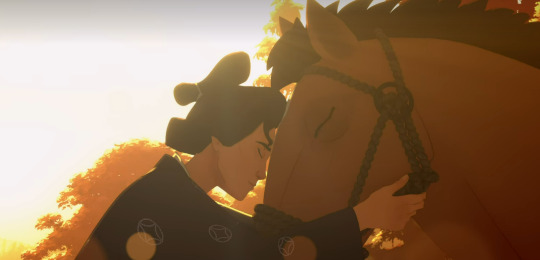
From there, the rest of the details of their character begin to contrast and juxtapose each other more clearly. So let's look at those differences, shall we?
Their backstory:
Mikio was a great samurai who was banished.
A somebody to a nobody.
Taigen was a fisherman’s son who rose to the top.
A nobody to a somebody.
2. The first time we meet them on-screen:
Mikio is an adult. An older man. Mizu's superior in age. He is Mizu's to-be husband. A love interest.
Taigen is a child. A young boy. Mizu's peer in age. He is Mizu's bully. An antagonist.

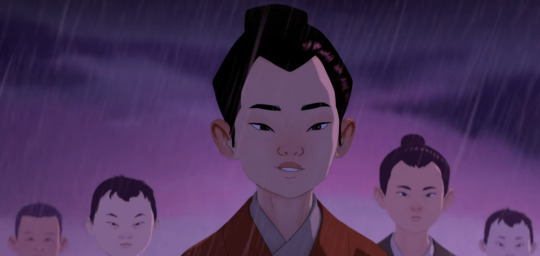
3. Their maturity and growth:
Mikio is mature, but stuck in his ways.
Taigen is immature, but capable of changing and learning.
4. Their overall attitude:
Mikio is generally relaxed, easy-going and unfussy.
Taigen is uptight, irritable and severe.
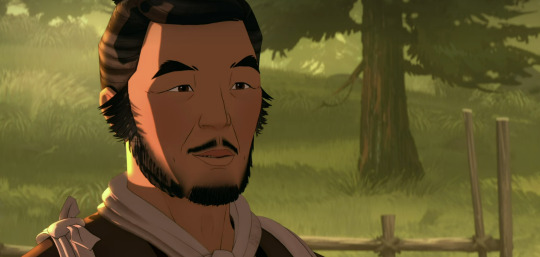
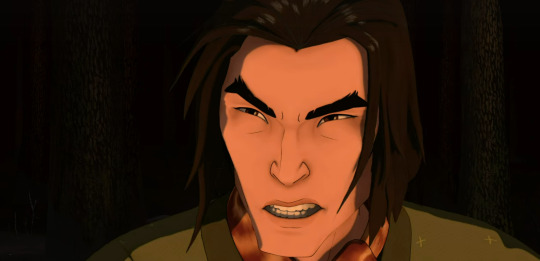
5. How they talk to and conduct themselves around Mizu:
Mikio is aloof, soft-spoken, and serious.
Taigen is obnoxious, brash, and sarcastic.
Mikio is quiet, speaking only when spoken to, even when Mizu turns to smile at him and shows openness to be near him.
Taigen is loud, talking while others are silent, even when Mizu turns from him and shows no interest in conversing with him.

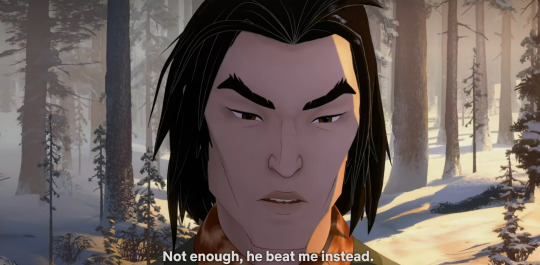
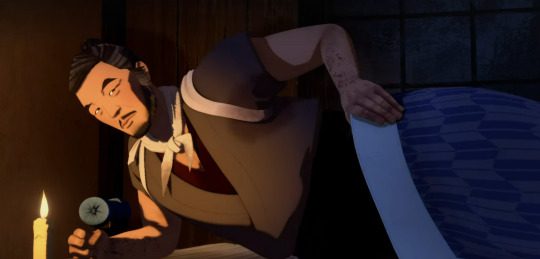

Mikio doesn't show much of who he is to Mizu throughout their marriage, despite their growing affection.
Taigen openly shares his traumas and life story to Mizu during their brief alliance, despite their mutual antagonism.
6. Their external vs internal selves:
Mikio is calm, gentle, and considerate on the outside.
Taigen is hot-headed, rude, and selfish on the outside.
Mikio is cowardly and deceitful on the inside.
Taigen is brave and loyal to a fault on the inside.
Mikio tells Mizu that he wants to know and see all of her.
But he scorns and betrays her, the woman he loves.
Taigen tells Mizu that he wants to duel and kill him.
But he endures torture to not betray him, the man he hates.
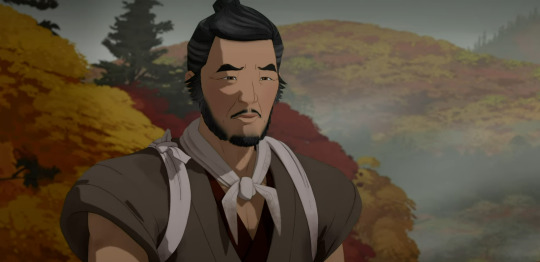
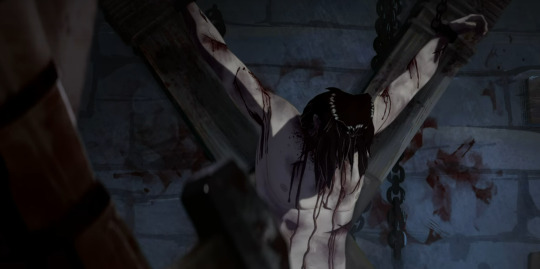


9. Their hair, a symbol of their honour:
Mikio's topknot is untied by Mizu during their spar.
This humiliation occurs in private, the two of them alone in a rural location where no one can see them.
Taigen's topknot is cut off by Mizu during their duel.
This humiliation occurs in public, the two of them being watched by many others in the Shindo Dojo.
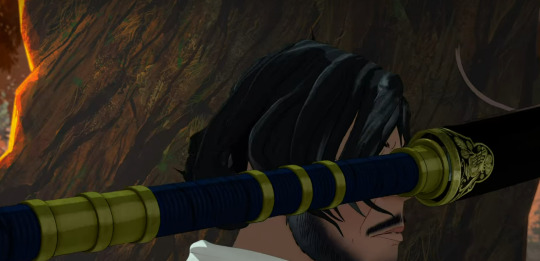
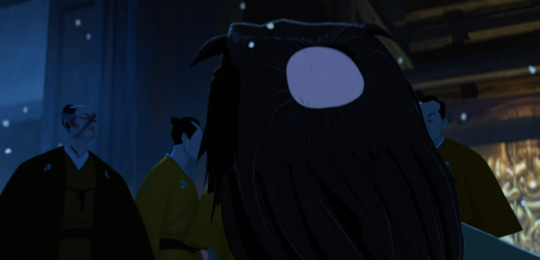
10. Their power dynamic with Mizu:
Mikio believes he is Mizu's mentor.
He teaches her to throw knives, how to ride and care for horses, and about the tactical benefits of using a naginata.
Taigen believes he is Mizu's equal.
He views Mizu as a samurai like himself who received all the same teachings he did, and who possesses the same values.
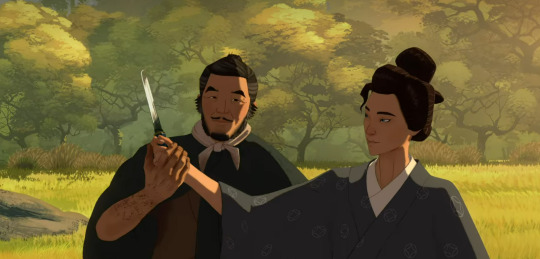
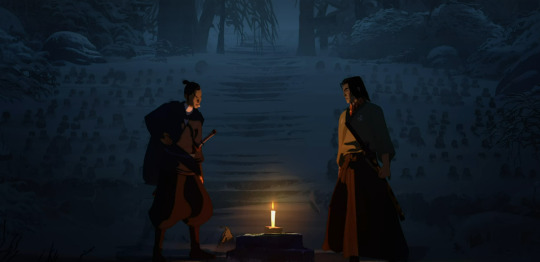
11. Their perceptions of Mizu:
Mikio sees Mizu's feminine side first.
He sees her as sweet and gentle, but also clumsy and incompetent.
Taigen sees Mizu's masculine side first.
He sees her as terrifying and deadly, but also strong and skilled.
12. The way they approach sparring with Mizu:
Mikio only spars with Mizu once. As the fight progresses and she is beating him, he tries to put a stop to it. When she teases/provokes him, he starts taking the fight personally and seriously, finding no enjoyment in it.
Taigen spars and brawls with Mizu all the time. No matter how many times Mizu beats him, he doesn't back down. When Mizu challenges him with a chopstick, he is eager to compete with her and gladly rises up to the challenge.
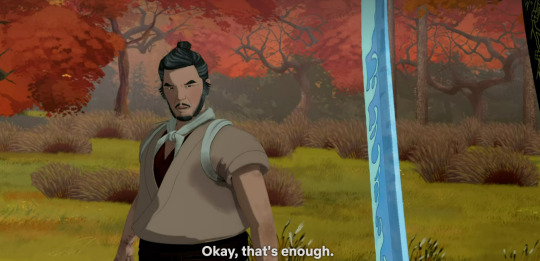
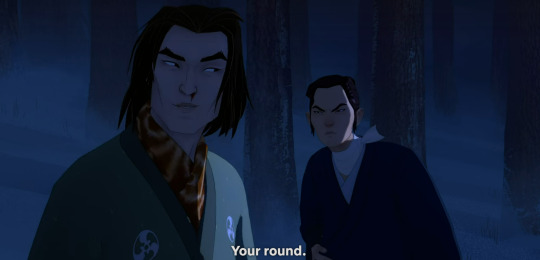
Mikio and Mizu's one and only spar is a friendly match; Mizu is smiling and having fun while he grows increasingly frustrated.
Taigen and Mizu's last-seen spar is a playful wrestling match; both him and Mizu are having fun and laughing.

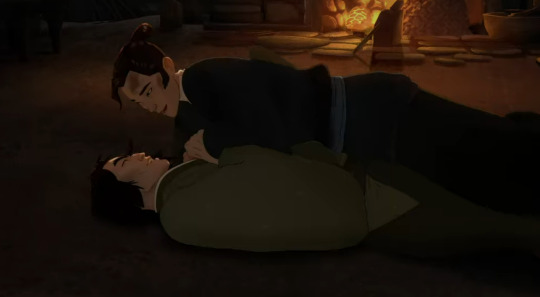
Mikio cannot deal with Mizu being better than him, so he scorns her and walks off, avoiding her thereafter.
When Taigen cannot deal with Mizu being better than him, he follows her to observe her moves and continues training in hopes to eventually beat her.
After being bested by Mizu once, Mikio leaves her and sells the horse he'd previously gifted to her.
After many times losing to Mizu and fighting alongside her, Taigen commends her and admits she is better than him.
13. When Mizu pins them down in a friendly spar:
Mikio sees Mizu's whole face objectively.
Taigen stares at Mizu's mouth and eyes.
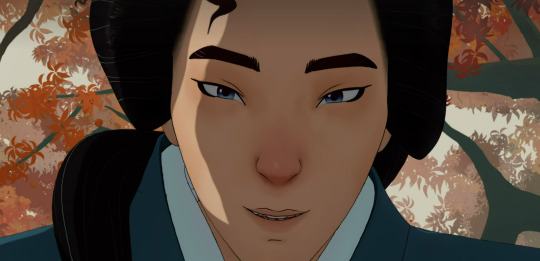

Mikio gets angry when she kisses him, throwing her off of him and snapping at her, calling her a monster.
Taigen gets aroused, apologising, so she pulls herself off of him.
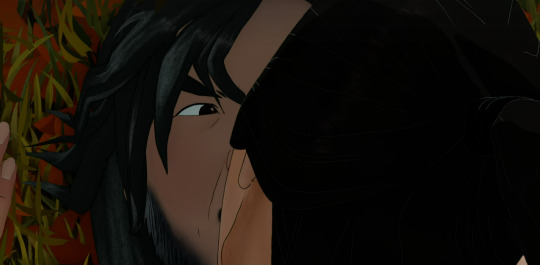
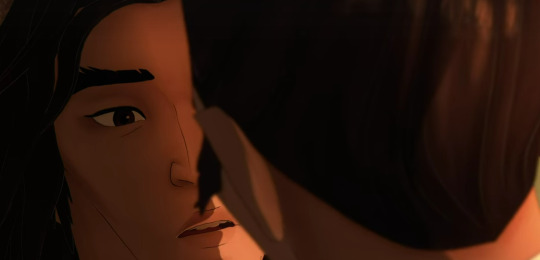
14. Mizu's blue meteorite sword is a reflection of her soul. She believes most are undeserving to face it, let alone hold it. And on that note:
Mikio is the first person (chronologically) that Mizu fights against using her sword.
Taigen is the first person (we see on-screen) that Mizu fights against with her sword.
Mikio is the first person (chronologically) to ever hold her sword, as she passes it to him, letting him wield it.
Taigen is the first person (we see on-screen) to ever hold her sword, as she passes out, and he picks it up and carries it for her.
15. Then, last but not least, in Fowler's fortress, when she is drugged and in pain, she hears Ringo's voice in the dungeon. She then follows it to an open cell:
Mizu first sees Mikio as a hallucination, the sight of him haunting her and causing her to lose her grip on reality. Her eyes glow a surreal blue to represent this.
Her Mama appears then and says Mizu's name accusingly.

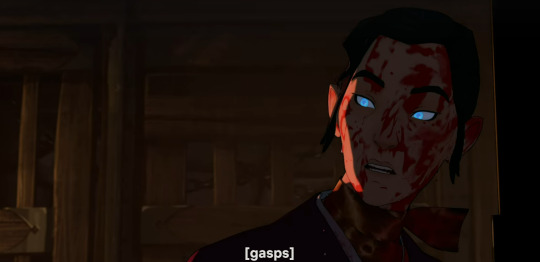
Mizu then sees Taigen, but he is real, the sight of him a relief and grounding her back to reality. Her eyes return to their normal blue colour to represent this.
Taigen looks at Mizu weakly and says her name softly.
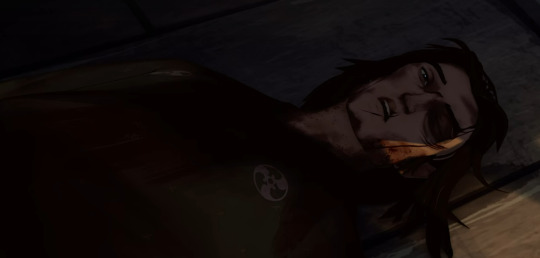

Then, later, when facing Fowler, her revenge awaiting her, she instead chooses to follow her conscience (represented by Ringo's voice in her mind), putting aside her vengeance for a time, in order to save Taigen.
So that's basically all the ones I've noticed so far, but even then, I feel there's already so much that forms a contrast between these two.
What makes it especially incredible about these juxtapositions is that Mikio was Mizu's husband, the man she had fallen in love with, the one person she had ever been intimate with, the man who made her begin to accept herself, to put down her desire for vengeance and instead live a life of peace and happiness.
So for Taigen to have so many parallels with him... Do you see what I'm saying here!
Not to mention that Mizu clearly already has some burgeoning attraction to him, as indicated by how she thinks of him when asked about her desires. And Taigen clearly has shown interest as well (see: him getting a boner after their spar, him holding her hand and telling her, "We're not done yet.").
And on the topic of speculating future possibilities of this relationship, this post by @stromblessed has pointed out yet another parallel between Taigen and Mikio:
Mizu promises Taigen to meet him for their duel in autumn.
Mizu fell in love with Mikio and duelled him during autumn.
With all that said, I do believe Mizu and Taigen's relationship is definitely hurtling towards something. But whether they will actually end up together in a sustainable relationship and have a happily ever after? Well, that is a whole other story; we'll just have to wait and see.
#blue eye samurai#mizu x taigen#taigen x mizu#taimizu#taigen blue eye samurai#blue eye samurai meta#hope yall enjoy my thesis on virgin mikio vs chad taigen#this was written last night when i shouldve been writing the new chapter for my taimizu fic that i promised i would work on....whoopsies...#i will get to it eventually but i just have to get a firmer grip on characterisation before i can delve further into it yk#on that note. i kiiinda regret posting the fic on a whim!#my last longfic was written better because i had the whole thing complete and could go back and edit/polish/revise before posting#so it came out much more coherent and consistent ykwim?#this fic might suffer a bit for this reason 🤒#but its fine i have to remind myself im just doing it for funsies#anyway here have another long ass meta post from yours truly#meta dissertations.pdf#shut up haydar#fandom.rtf
437 notes
·
View notes
Text

the star you've longed for
#PLEASE WATCH REVUE STARLIGHT!!!!!!💥💥💥💥💥#project sekai#revue starlight#pjsk#emu otori#nene kusanagi#emunene#prsk#proseka#yuri win. i make my fav pairing fight tothe death#HAPPY EMUNENE WEEK LOOOOOL#Can i be hinestni think this sucks it took way too long cause i forgot how to draw for a week#im seeing demons and stuff. i feel more normal now. Also you may recall emu has a big hammer for revstar#thats the bottom of it the gem thing all the weapons have hers is sharp#i remember seeing meta post abt how mahiru has a blunt weapon because she never actually aimed for the lead role#rather she only wanted to be by karen's side. so her weapon wasnt capable of cutting anything in the first place#Fastforward to the movie and well LOLLLLL#though i think its funny in the movie her mace is still mostly used for i timidation againstbhikari.. bc again shes not winning for a lead#revue starlight youre neat. maybe i like revstar.#<- has been insane for 4+ years#Needed their pose to be smth where nenes weapon isnt visible because I DONT KNOW WHAT WEAPON TO GIVE HER. OOMFS HELP. I NEED A NENE WEAPON.#i thought some sort of polearm/spear/halberd etc something with range but that can be ambitious#but i feel like smth with that much footwork needed doesnt suit her.. And she cant hsve a sniper i dont think thatwould fucking work#aruru gets pistols in the revue but aruru also is Ummm well shes uhhh. [screaming] [car crash]#throwing knives would be funny wouldnt it. Put that gamer aim to use#idk if the emunene week tag is on here but i'll donit anyways#emuneneweek2024#i remembered to switch which account this pists to for the first time in like 3 pists. so you get to see all my tags this time#rather than accidentally posting it to the wrong account and having to dekete and repost andngoing IM NOT WRITING ALL THAT AGAIN.
237 notes
·
View notes
Text
tbh I still think Brock Rumlow was an interesting character and upon further examination way more unsettling a villain than most to me because like. Let’s be real, the second you lay eyes on Robert Redford as Pierce monologuing in his pristine suit and glass office high up in the sky he just screams Evil Politician! at you. You can see it coming a mile away. Meanwhile Rumlow is….Just Some Guy. On the surface, he’s just some side dude. He’s not enhanced, he’s not in some major position of power, he’s just someone who’s really good at what he does and seems dedicated enough to the work and functions well with his team. He respects Steve, might admire him even, but not so much that he gets starry eyed like everybody else. He’s lighthearted but focused, he’s no nonsense, he’s the everyman Steve can relate to way more than spooks like Natasha or Fury.
And okay, maybe what Rumlow does for a living is beat intimidate and kill people, but it’s not like that’s the primary objective, right, because SHIELD are the good guys and this is what Steve does now, too, anyway; except that Steve doesn’t really use any weapons other than the shield, he holds back, he doesn’t carry a gun anymore which is usually fine since he’s dangerous enough without it. But when that leaves him vulnerable, he’s covered: Rumlow’s got his six, and he does it well, and he earns some of his trust. This is familiar to Steve.
And maybe Rumlow’s a little too good, fine, maybe he shoots a guy in the head within the first fifteen minutes of the movie when he doesn’t necessarily have to and then cracks jokes immediately after but that’s alright too, because that guy had Steve at gunpoint and that guy was Bad whereas Rumlow is One of the Good Guys just doing his job, right. Rumlow’s joking around because he’s used to the violence, they’re all used to it, and this is just how it works. They’re just soldiers doing the grunt work and following orders, and this is familiar, too.
Except that they’re not soldiers and this isn’t a war, except that the work is for an intelligence agency whose job it is to hoard and steal information and monitor civilians and orchestrate and sabotage and meddle in internal and external state affairs. Except that the Good Guys, in reality, are extremely grey at best. Except that many of the Good Guys turn out to be Nazis on top of everything else, and it’s not that far of a stretch.
But when it’s all starting to unravel, you’re still thinking well maybe some of these guys didn’t know. Maybe they didn’t do it out of individual belief, and if faced with the right choice, they can be redeemed.
That is until you realize that Rumlow maybe didn’t respect Steve and what he did so much as what Steve could do if only Steve weren’t “weak” in other ways, if Steve had chosen the right side. That it not being personal is less a cop out and more a taunt the same way just following orders has always been, for Rumlow and many many men that came before him and will continue to come after. Until the vault when, by the most charitable of interpretations, Rumlow looks at the Winter Soldier letting himself be smacked around and crying and getting shocked like he’s maybe a little unnerved (if not just downright fascinated) by the whole thing, but not enough that it really changes anything for him, because the end justifies the means and it’s not really his problem, anyway.
Until Sam shows up and Rumlow looks at him like a bird of prey and says This is gonna hurt with a fucking smile on his face, and then you think: shit, man, obviously. How was it not clear from the start.
To me, what makes someone like Rumlow a good villain, even a side one, is not that he’s straight up Insane & Evil™️ or suffering from Tragic Backstory Syndrome or all hopped up on magic superstrength juice or whatever, but precisely the fact that he’s Just Some Guy with a cockroach survival mentality who operates well within the established system and just so happens to be really good at his job - a job that he might’ve even joined thinking it was for a good cause, or because he had something to prove, or simply because it gave him one hell of an excuse to be a bully. Because he either wholeheartedly believes in HYDRA or he just doesn’t give much of a shit either way so long as he gets his due in the end, and both are just as bad.
Because when you strip away all the grand scale superhero theatrics, you’ve seen this before. You’ve seen Rumlows in your school and in your neighborhood and in the military and the cop car patrolling your street. They’re the ones who sometimes say or do somewhat offputting shit but you figure it’s fine because they’re otherwise real nice or charismatic or normal looking, or maybe they work a job that’s framed as helpful or protective or inherently good despite the power dynamics at play, or they share your background and interests and you chat about the weather being crap this time of year.
And every time one of them turns out to be a violent, hateful piece of shit, you’re still somehow surprised then, too, when you really shouldn’t be.
#apologies for the extra long post but I’ve been thinking about why he freaks me out as much as he does#the world is full of brock rumlows is all i’m saying.#and that to me is way more terrifying than evil crazy russians in underground labs or deranged aliens could ever be#brock rumlow#ca: tws#brock rumlow meta#I guess???? hello how the fuck did I get here at 5 pm on a tuesday jesus christ#mcu meta#max.txt
295 notes
·
View notes
Text
Sometimes I think about Astarion’s (10) charisma and it makes me so sad because (as a person not blessed with any sort of natural charisma whatsoever) I know how tiring and stressful it is to ‘switch on’ and play along to seem charming and make conversation with strangers in real life situations. It’s incredibly mentally draining (which in turn is physically exhausting) and Astarion has had to do this every night for 200 years.
200 years.
Putting on a mask and turning on charm-mode with strangers a handful of times a month (along with liquid courage to help) is bad enough… but every single night for 2 centuries?
He was a magistrate and definitely had the skills to deal with people, but that doesn’t mean that he had to be pleasant to them. In fact he was likely a harsh judge (going by the screenshot from Act 3 below, as well as his sentencing of the Gur which essentially got him ‘killed’), and due to some of the things he says he was likely an asshole whilst doing the judging, and possibly an insufferable asshole at that. (For example, referring to Gur people in derogatory terms in general, how he dismisses the lives of the captured gnomes in Grymforge but held the Drow (Nere’s) life in esteem etc.) (Also to be clear, none of his past remotely warrants what happens to him)
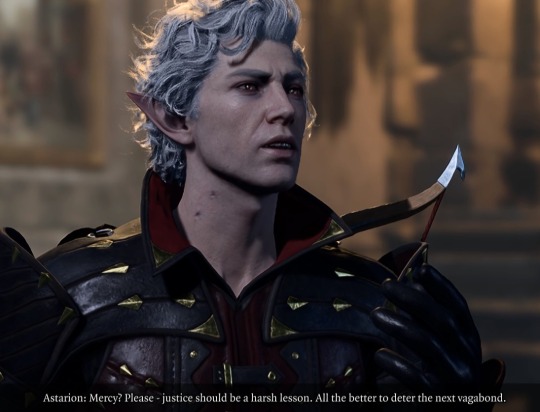
[Astarion: Mercy? Please - justice should be a harsh lesson. All the better to deter the next vagabond.]
With this lack of people pleasing skills I can only imagine how Cazador (or fucking Godey) would have tortured him for not being alluring enough when he’s first learning to navigate the absolute horror story of a reality he’d found himself thrown into. Cazador very likely didn’t choose him to be a spawn for his charisma, he chose Astarion for his looks alone and then proceeded to punish him for not having the personality to charm people efficiently, for not being agreeable or enchanting enough to garner a victim's trust to lure them back to the palace.
I think about how he would say the lines that he (very quickly) had to learn of what people wanted to hear over and over in his head, picturing how he should act, when to smile and laugh, where to touch a hand or arm when appropriate and ultimately how to use himself for seduction as he laid on the cold stone floors in the dirty kennel, staring at the dark ceiling, his new vampiric hunger insatiable as he was being starved, beaten, belittled. Hopeless.
And so he did learn, because his survival depended on it.
He survived for 200 years.
I think about all of this a lot.
#just me rambling in the night#I always get so sad when I think of his past#poor little star#astarion#astarion thoughts#astarion meta#bg3#baldur's gate 3#bg3 spoilers#cazador szarr#long post#abuse#snowyrambles
571 notes
·
View notes
Text
recontextualizing this story through the lens of buck/eddie and what it means for them, is like. it's so interesting because recently, i got an anon that asked me (paraphrasing) if i thought 9-1-1 would actually "go there" with buck and eddie as individuals, and that three main characters discovering their queerness would be "too much" for the general audience. and, like, not withstanding that it's actually true to life — that queer people can and do naturally gravitate toward each other even when we aren't out / passing / aware of our sexualities at the time — it's also just like. the belief (or disbelief) that 911 wouldn't "go there" with their stories also comes with this inherent assumption that there's only one way to tell a queer discovery story.
like. when michael came out in season 1, he was already at the end of his journey. he had already walked through the self-hate and forced closeting and came out on the other side to self acceptance. when we meet michael, he is a queer man, a gay man (because the word is important), who has already stepped into self actualization and is ready to live his truth. this is not the story 911 is telling with buck.
and then with eddie, you have this character that is introduced with the idea of being perfect, as ryan said, of having it all together, only for the audience to realize he's not. only for the audience to realize that he's broken and cracked on the inside and that a lot of it stems from war. but most of it? most of it doesn't. most of it stems from his father, and from how he was raised. raised to shut it down, to swallow things whole even if they hurt, even if they make him bleed. he was told to keep it all quiet, repress repress repress. and so. i know this is an unpopular opinion, but to that end, i don't think an explicit queer discovery storyline is necessary for him, in the sense that, subtextually, i think it's already happened. season 5 was very much eddie's unrepression arc. we dug deep into the things that make eddie diaz, eddie diaz. and a lot of that was war. violence. chaos."warzones are my thing." but if that was all that his arc was meant to be, why have it end with a conversation with his father? they could have played that arc out in so many different ways.
for one, they could have had mills still be alive. they could have had her and eddie reconnect. they could have had her and eddie have a conversation where she shoulders some of the weight that eddie's been putting on himself and have him settle into the peace of the realization that he's not alone in this specific thing, that he never has been, that other people survived what he did and that he can find solace in them. but the writers didn't do that. they took it back to his childhood, to the root of where eddie diaz began and they said, this is where you need to go. this is what you need to address before you can heal and move on. so that conversation with his dad that culminated in him choosing wellness, in him choosing happiness, in him choosing safety in his body for himself has very much always read to me as queer acceptance even if not explicit (due to the assumed barriers that were placed on that story at the time).
eddie has always been with women, eddie has always liked being with women, so i'd be shocked if he's ever even thought about the nuances of his sexuality. but his unrepression in season 5, to me, has always made him open to the possibility of falling into whatever comes next, whatever that looks like.
this is also not the story they're telling with buck.
(as a side note, i'd just like to say that queer subtext is still queer existence. subtext is how our stories have been told for generations, well before we were able to take up space on the page, and subtext is still a wholly valid and beautiful way of telling a queer story. please don't forget that).
so then, finally, we get to buck, and he's so very new at this. so very green he may as well be a blade of grass on a country club golf course. and so, despite the fact that there have already been two queer storylines prior, this is the first time in 9-1-1 (and tv!) history, that we have ever gotten to see an unplanned queer character discover who he is at this intimate, detailed level. we get to see buck's story unfold in real time, we get to learn about who this actualized version of himself is, as he is realizing it, and we get to know and dissect the layers and nuances, the ebbs and flows of his sexuality as he's taking himself apart and seeing what's underneath.
friends. this is the story they've always needed to tell.
and so, when i think about buck and eddie, and i think about their progression toward a romantic relationship and what that would look like, realistically and in the eyes of the audience, buck has really always been the missing key. we've talked about it before — who he is, who he was, has in no way been ready for eddie on multiple levels. whether it was because of his insecurity, his lack of place in the world, etc, buck has always been (for lack of a better word) too immature for eddie. eddie is a single father. he doesn't have time to play games, and though he will always love and reassure buck when he needs it, he doesn't have time to heal buck for him. nor should he. so buck was the only one who canonically, canonically, needed to be yanked from point a to point z.
and. it's like everyone's said, even before the season began — buck has been on a hamster wheel, buck has been stuck in a rut, yadda yadda yadda, which means that, as far as the audience was concerned, what always was for buck (women) is what always would have been. and there was nothing in canon, nothing concrete to disprove them from believing so. so we needed him to fall into something, not just radical, but sometime new.
and when i think about buck, and when i think about eddie, and when i think about their stories both as individuals and together, buck has, realistically, been the only real stopping point. at least with eddie, when the time is right and buck/eddie go canon, we, the audience, can go back in time and we can look at the way he came into himself and settled into his identity as a person, as a man, and say, like, oh okay, this is the moment. you know? we don't need the writers to take our hands and guide us through the same processes buck is experiencing because eddie's already had his ah moment, he's already experienced the moment where he decides that his life and his needs and his joy and his liberation are just as beautiful and valuable and worthy like everyone else's.
so when people ask, like, "would 9-1-1 really go there with three queer discovery arcs?" it's just like. well yes. they already have. we've already there. in fact, we're well into the third and final act. buck, eddie, and the audience, are almost ready — as in, actively ready — for each other. and yes, sure, even after the meat of this arc has passed, there will still be some things buck and eddie need to learn — specifically, they will need to learn that, not only do they have feelings for each other, but that feelings for each other is actually an option — but. for all intents and purposes, this is the crescendo before the final chord. this is it. and the thought that we've been here, that we've witnessed these three beautiful queer storylines unfold with these three beautiful characters (two of which are gentle, loving, present men of color) makes me entirely too emotional for words. tbh.
#what 9-1-1 is doing ... what they have done — despite this long ass post — it goes beyond articulation. it really does.#to comprehend that we are standing on the precipice of something so uniquely raw and life-changing in the way queer stories are told — it#doesn't get much better...more surreal than this. i know it's been said but the level of care and intention that has gone into telling these#stories is in itself a rarity. and the fact that we get to witness it — that we get to spend this time together — with a cast and crew that#loves these stories and loves these characters as much if not more than we do? its powerful as hell. what a surreal experience this has been#thinking many thoughts and crying many tears#tv: 911#jack.txt#meta#long post
259 notes
·
View notes
Text
Glad to see that Tim being a giant Dick Grayson fanboy is finally being highlighted again, and sparking more discussion especially on their early relationship! (Please gimme more!!! I love them so much, augh!)
Probably as a result of that surge, there seems to be reciprocal chatter on the topic of how young Tim actually felt towards Jason, too. It's honestly pretty interesting, because it's more nuanced than it appears at first glance.
Which means it's very fun to dissect! ✨
There's a degree of subjectivity to keep in mind, because readers are going to have different interpretations of the same scenes, or will pull from entirely different scenes than one another to form their individual view on this topic. That's just how it is in comic book fandom, for many things! Regardless, in this case... if the scale ranges from the extreme of "Jason was Tim's Robin" to the other extreme of "Tim actually hated Jason [as Robin] or thought he was a loser that got himself killed" — the actual truth is closer to the middle, as is often the case.
At least, in my opinion.
Mainly I want to focus on those relatively early days with this post, to highlight Tim's initial(-ish) feelings towards his heroes, and touch on the point at which they really begin to change. This turned into a very long post, though. Brevity is beyond my skill, so grab snacks and water lol. Transcripts for each image will be posted at the very end under the cut.
So, the two storylines I want to cover are "Rite of Passage," which is rolls into "Identity Crisis." (NOT to be confused with the major crossover event "Identity Crisis™" which came years later, and is where Jack Drake dies.... But it sure is an interesting coincidence that Tim deals with the loss of each parent in two similarly named stories!) These take place before Tim is even Robin, and I'll be considering them as one arc for this post.
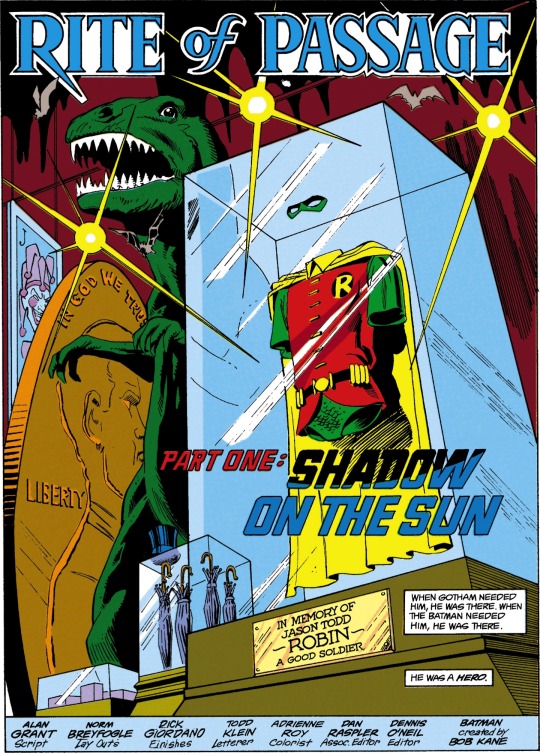
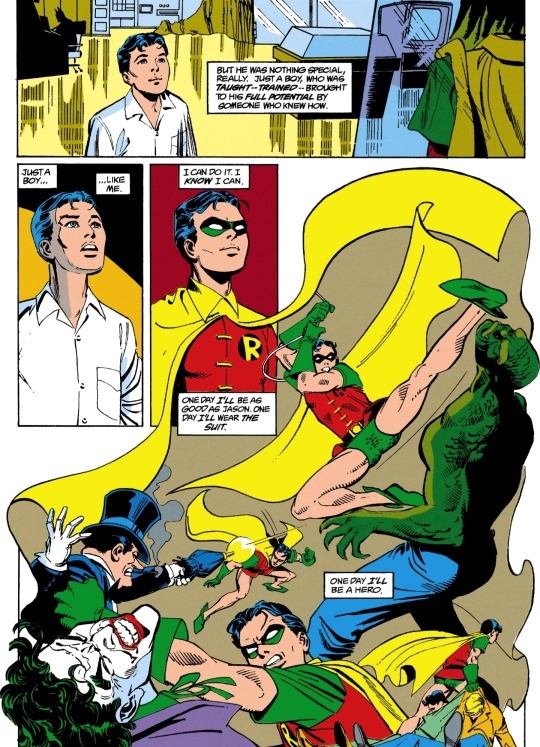
Detective Comics vol. 1 #618 (July, 1990) -- Pages 1 & 2
"When Gotham needed him, he was there. When the Batman needed him, he was there. He was a hero."
"One day, I'll be as good as Jason. One day I'll wear the suit."
To start off, we have this opening from "Rite of Passage." Tim is still in training here, mainly helping Bruce with minor stuff from the cave. His parents are off traveling, alive and well as of these next few pages. He's still bright-eyed and full of wonder. An extraordinarily weird but ultimately innocent kid.
So his view on Jason is positive and fairly simple: a hero, and someone to look up to as Robin. Clearly, Tim here doesn't think Jason was deficient in his role, either as a protector of Gotham or as Batman's trusted partner.
Moreover, Tim already held Dick in very high regard because he was amazingly skilled before he became Robin. To Tim, that's not something he'll ever be able to achieve. Meanwhile, Jason wasn't like that. He was a regular kid without crazy acrobatic training since practically birth. Yet he still went on to be a hero—which is obviously motivational for Tim who finds himself in similar shoes.
It's true that Tim only ever knew or thought of Jason as Robin, and idolized him in that regard. But that's kind of all that mattered to him at that point, because he was this kid who was utterly star-struck by his heroes. Even if he's technically aware of their shortcomings as people, it's overshadowed by the hero-worship.
It was kind of the same with Bruce as Batman at first. (Which was still enough for Tim to risk life and limb to help his beloved hero, before Bruce even knew his name.) Dick was the only one Tim had any sort of "personal" relationship with beforehand, so there is an extra level of attachment—and hence why it was the nidus for his obsession with Batman. Yet even then, it wasn't like he actually knew anything about Dick as a person until later. Until then, Tim's ideas of him were all he had, too. With Jason, Tim just didn't get to know him at any point before his return (oof), apart from what he heard over the years secondhand (also oof).
Ultimately, it's the loss of innocence—along with the ricocheting bullet that is the unresolved guilt of those around him—that begins to change Tim's perception. Not just of Jason, but of things in general.
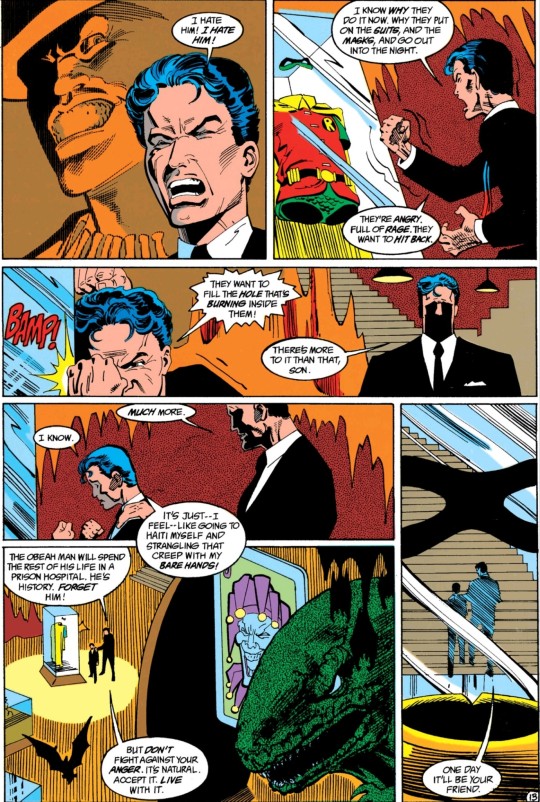
Batman vol. 1 #455 (Oct., 1990) -- Page 13
"I know why they do it now. Why they put on the suits, and the masks, and go out into the night. They're angry, they're full of rage. They want to hit back."
Losing his mother was a major shift for Tim, obviously. This is right after the previous storyline, and Tim's had the worst week or two of his life (so far). His monologue here is a reference to what happened to both Dick and Jason. The unbearable pain of loss, the rage masking the grief underneath. And importantly, that he feels both of them were justified in their anger. (And Bruce too, indirectly.)
The major theme of the aptly named "Identity Crisis" is to mirror aspects of Dick and Jason and Tim's lives—to show how they converged onto the same tragic road. It's something that Tim notices early in the story, and was frightened by. Now, horrifically, it's become a part of him as well. His parents are gone, and he was entirely helpless to do anything about it. Dick was the same way, Jason was the same way. The cycle is repeated.
In particular, the part about him wanting to go to Haiti for revenge—for his mother—sort of struck me as being an intentional parallel to Jason and Ethiopia. It's a bit of a stretch, especially in isolation, so others may see it differently (e.g. the angry ramblings of a grieving child that does sound like something anyone might say). But it always stuck out to me because of how much Tim is compared directly to Jason in this arc. More on that below.
It's not something I can really give an accurate feel of because it's a lot of subtle things that begin to add up, so I'd encourage folks to read this arc themselves to see what I mean. (Or maybe you'll still disagree which is fine too lol.) Again, many things are in reference to both Dick and Jason in relation to Tim, but it's weighted more on Jason's side.

Batman vol. 1 #455 (Oct., 1990) -- Page 18
"You think my anger will boil over, the way Jason's did. I can assure you, it won't!"
Tim's grief has begun to pull away the veil of idealism that enshrouded his heroes in his mind. It doesn't apply only to Jason, but to the rest of them. Plus add the fact that Tim's keenly aware that he's being managed, even if the adults around him are careful to not outright say certain things. He still knows.
Bruce, Dick, and Alfred are all worried about Tim potentially turning into "another Jason." They (and mainly Bruce) caution Tim to not ignore his emotions, but they're still concerned that he may be overly eager to prove himself in order to cope, and could get hurt or killed as a result. While they aren't wrong for their caution—especially at how unsettlingly similar all the circumstances are—they aren't very subtle about the elephant in the room.
Imagine how that would affect Tim's perception of his predecessor, especially when he's in the midst of a traumatic event he hasn't had time to fully process. The negative association is pretty much inevitable.
Tim's known from day one that he's walking in Jason's shadow, and now it's become inescapable. Tim went from seeing Jason as a goal to reach, to feeling that unless he surpasses him, he wasn't going to be taken seriously by anyone. However, as of this arc, Tim doesn't even fully come to that point yet.

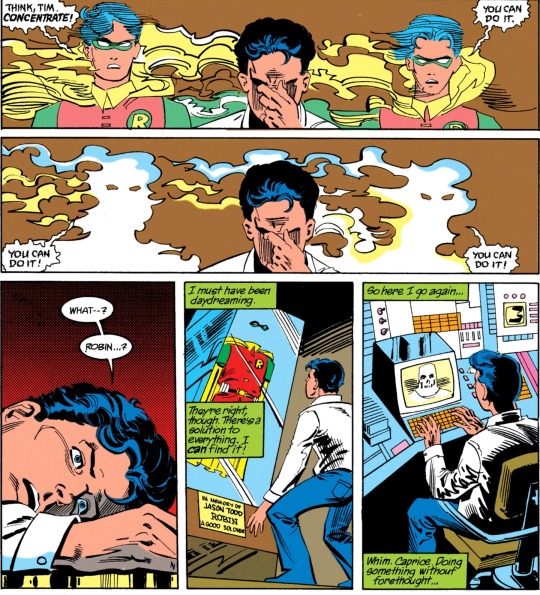
Batman vol. 1 #456 (Nov., 1990) -- Pages 14 & 15
"Drop-outs don't make it. And dead heroes are no use to anyone!"
It's really easy to take away "Tim totally thought Jason got himself killed" as the main thing here, but I think that's missing the forest for the trees.
First some context: Bruce has gone out on a mission to get Scarecrow, and expressly forbade Tim from doing any shenanigans. Meanwhile, Tim is grappling with wanting to prove himself and trying to help Bruce from the cave, all while trying to deal with his emotions. At some point, he falls asleep and ends up having like... exhaustion-grief hallucinations of Dick!Robin and Jason!Robin who confusingly caution yet encourage him. The main theme of this part is facing your fears.
Depending on how you want to interpret the intent of Jason's dialogue here, you could go several ways with it. Ranging from "writer's feelings towards Jason" to "a peek into Tim's mind as his fears manifest as visions of his heroes" or some mixture thereof.
Though Tim argues with Bruce that Batman needs a Robin, we're shown that Tim is understandably scared of joining Batman's "war." He's still not willing to let Bruce go it alone, though, and that's something he feels more strongly than his fear.
Meanwhile, hallucination!Jason's warnings are a lamentation of what happened to him in a way, but it actually exactly describes Tim's current situation even more so. Unlike Jason, Tim is under-trained, under-experienced, doesn't even have a suit of his own yet. But like Jason, he can't sit by and do nothing while someone he cares about is in danger. Tim knows that if he goes out there, he will probably get himself killed, and it will be his own fault. So he's about to disobey Batman's orders, and fly right into danger. If that got Jason killed, then Tim—who is in a way worse position experience-wise—has every chance of ending up the same.
Like... it's about Jason, but it's also about Tim. It's Tim's worst fears made manifest, via the representation of why he is even here in the first place (Jason's death).
That's my theory anyway, but perhaps this is an overly charitable reading of this scene on my end. (Not that I think that makes me wrong lol.) However given that Grant wrote both parts of this arc, and the beginning of which is especially favorable towards Jason, it certainly is something to ponder. I have a lot of thoughts on it I can't expand on here tbh but perhaps that'll be another post.
Anyway, returning to the point of the similarities vs differences between Tim and Jason: since this is the arc that solidified Tim as the next Robin in comic continuity, it makes sense that the writers really pushed the comparisons between the two of them, specifically. (Even though Dick was pretty similar, as going against Batman's orders is the Robin thing to do, it's not his shoes Tim is directly filling.) So making Tim's "debut" story arc mirror Jason's "swansong" is an obvious narrative choice.
To drive home the parallels, I wanted to include this panel from just a few pages prior to the "daydream":
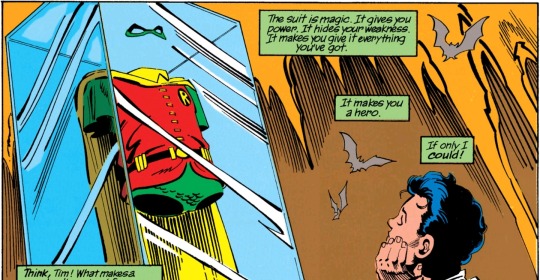
Batman vol. 1 #456 (Nov., 1990) -- Page 9
"The suit is magic."
That so distressingly close to Jason's famous "being Robin gives me magic" line (Batman #385, page 6). Given all the previous context, it's hard for me to just dismiss it as pure coincidence. Even if it is, the point still stands. Tim is shown having the some of the same heartbreakingly naive views as Jason once did, right in front of Jason's memorial, just as he's about to go and run off into the night against orders.
I think that speaks for itself. There's a lot to take away from it, if you so choose. Especially given the context of that specific Jason arc.
Alright, back to the main course:
So in the end, Tim actually goes out in civvies and a ski mask because if he fails, then at least he wouldn't bring shame to Robin's legacy™. When he gets fear gassed saving Batman, it's once again both Dick and Jason that he hallucinates encouraging him to push past his fear. (Shout out to the fact that he's literally more afraid of tarnishing the legacy of Batman & Robin than he is of dying.... I'm sure this will not be a recurring thing for him in the future.)
Tim's ideology is shown to be similar to Jason's, and the actions Tim ultimately takes are similar to Jason's... but the outcome is different. And it really isn't just "Tim succeeded where Jason failed." At least, that's not what I took away from this. Rather, Tim had no reason to succeed any more than he had to fail, just that he did. Luck combined with caution because he knew what happened to his predecessor, and the fact that Batman was there to finish the job all made the difference.
You could say (and I know some will) that it's just classic Jason character assassination and the writers trying to implore readers that this new kid is different we promise pls don't hate us look how much better he is! But in this case, that feels like it undermines the whole point of this story. It doesn't fit with what the characters actually say.
Thus, we return to the question of how Tim felt towards his predecessor. And the answer is different from where we started, because Tim is different. Not that different though. Because even though at this point Tim—like all the adults around him—has probably attributed Jason "going off on his own" being what led to his death, Tim still thought of him as a hero to look up to. It's about Robin, first and foremost, yes. But Tim is fully aware of the people who made that suit mean what it does, because it's all intertwined.
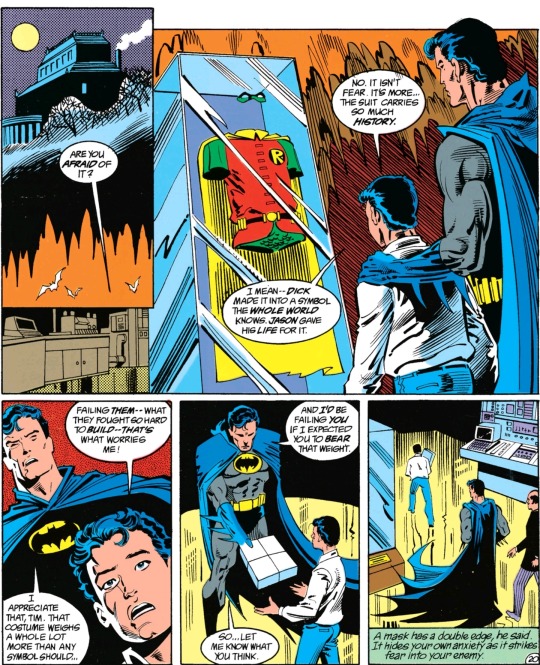
Batman vol. 1 #457 (Dec., 1990) -- Page 20
"I mean--Dick made it into a symbol the whole world knows. Jason gave his life for it."
Even further, Tim thinks of it in terms of Jason having given his life for what he believed in, for the legacy that now falls to Tim. There's a sense of gravitas there. He's afraid of failing both the Robins who came before him.
Ultimately do I think Tim adored and loved Jason on the same level as Dick or something? No. It's not comparable. (Dick was like part of some of Tim's earliest memories and everything! They have a really unique bond ok.) Yet Tim was also far from thinking poorly of Jason so early on. Frankly, it seems that Tim thought of Jason as a noble hero and a cautionary tale. Yes he took risks and sometimes went too far, generally stuff that Tim doesn't want to repeat and all that. At the same time, Tim still saw him as someone whose legacy and memory was worth honoring.
It's complicated, which is why I like it so much—because it feels real. Having conflicting feelings towards someone is... so human. Especially someone you never got to know, yet who plays such an integral role in your life via the shadow of their death. How can you feel anything but complicated towards them?
It has to be said that, yes, Tim's views—even before Jason's return—change over the years. He becomes more jaded as a person and is surrounded by people who are even more jaded than him... and who often mention Jason as the "failed Robin." It's something that's hung over Tim's head all the damn time. The curse of the Robin mantle.
So it shouldn't come as a surprise that Tim's idea of him becomes more akin to "sounds like a skill issue" as the years go by. All bets are off after Jason's return, and the Titans Tower Incident™. At that point it's firmly "I am better than you, loser" lmao.
And... that's all without getting too into things like authorial intent and general "moods" of different DC writers towards Jason at a given point. Or retcons that played a role in his characterization and how other characters talk about him, depending on what "era" you're reading. That's way beyond the scope of this post though!
TLDR; even though young Tim Drake was obsessed with Dick Grayson as Robin, he still looked up to Jason Todd as well. He didn't think of Jason as a cringefail loser until later. :)
(image dialogue transcripts under cut ↓)
Dialogue Transcript for Image 1 (Detective Comics vol. 1 #618 -- Page 1):
Narration box (Tim): When Gotham needed him, he was there. When the Batman needed him, he was there. He was a hero.
Dialogue Transcript for Image 2 (Detective Comics vol. 1 #618 -- Page 2):
(Scene continued from previous page)
Narration box: But he was nothing special, really. Just a boy, who was taught--trained--brought to his full potential by someone who knew how. Just a boy... like me. I know I can do it. I know I can. One day I'll be as good as Jason. One day I'll wear the suit. One day I'll be a hero.
Dialogue Transcript for Image 3 (Batman vol. 1 #455 -- Page 13):
Tim: I hate him! I hate him! I know why they do it now. Why they put on the suits, and the masks, and go out into the night. They're angry. Full of rage. They want to hit back. They want to fill the hole that's burning inside them.
Bruce: There's more to it than that, son. Much more.
Tim: I know. It's just--I feel--like going to Haiti myself and strangling that creep with my bare hands!
Bruce: The Obeah Man will spend the rest of his life in a prison hospital. He's history. Forget him! But don't fight against your anger. It's natural. Accept it. Live with it. One day it'll be your friend.
Dialogue Transcript for Image 4 (Batman vol. 1 #455 -- Panels from page 18):
Tim: Because you think my mother's death has upset me too much. Well, it did. But I've taken your words to heart. I can cope. You think my anger will boil over, the way Jason's did. I can assure you, it won't. But that doesn't make any difference, does it? Why can't you have a little faith in me?
Dialogue Transcript for Image 5 (Batman vol. 1 #456 -- Page 14):
Narration box (Tim): Blast it! My head's starting to swim. I'm about ready to give up. I almost wish I'd never heard of Batman and Robin!
Vision Dick: Heroes never give up, Tim.
Vision Jason: You know that.
Tim: Dick--! Jason Todd!
Vision Dick: You're training to fight in a war, Tim. It'll last all your life. No matter what, you have to go on fighting.
Vision Jason: Drop-outs don't make it. And dead heroes are no use to anyone! I thought I knew better than Batman. I thought I could run before I could walk. I killed myself, Tim. Because I couldn't wait. Because I couldn't think it through.
Dialogue Transcript for Image 6 (Batman vol. 1 #456 -- Page 15):
(Scene continued from previous page)
Vision Dick: Think, Tim. Concentrate!
Vision Jason: You can do it.
Both: You can do it!
Tim, waking up: What--? Robin...?
Narration box (Tim): I must have been daydreaming. They're right, though. There's a solution to everything. I can find it! So here I go again... Whim. Caprice. Doing something without forethought.
Dialogue Transcript for Image 7 (Batman vol. 1 #456 -- Panel from page 9):
Narration box (Tim): The suit is magic. It gives you power. It hides your weakness. It makes you give it everything you've got. It makes you a hero. If only I could!
Dialogue Transcript for Image 8 (Batman vol. 1 #457 -- Page 20):
Bruce: Are you afraid of it?
Tim: No. It isn't fear. It's more... the suit carries so much history. I mean--Dick made it into a symbol the whole world knows. Jason gave his life for it. Failing them--what they fought so hard to build--that's what worries me!
Bruce: I appreciate that, Tim. That costume weighs a whole lot more than any symbol should... and I'd be failing you if I expected you to bear that weight. So... let me know what you think.
Narration box: A mask has a double edged, he said. It hides your own anxiety as it strikes fear into your enemy.
#tim drake#jason todd#dcu#dc comcis#batfamily#meta#I'm so sorry this post got out of hand fr#it was meant to be a quick drabble with some comic panels and instead i just...... kept going#this post is specifically for my one (1) bestie who cares and the like 2 ppl who might be as insane as me about Timmy#idk why I'm like this im just obsessed with Tim's relationship with early Batfam & co lately???#late 80 and early 90s comics my beloveds......#anyway if this gets more than 5 notes i'll be shocked and scared lol#nyerus.txt#text post#long post
538 notes
·
View notes
Note
Hear me out…Meta Knight and Starstruck
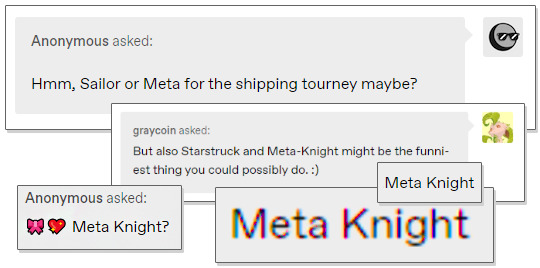
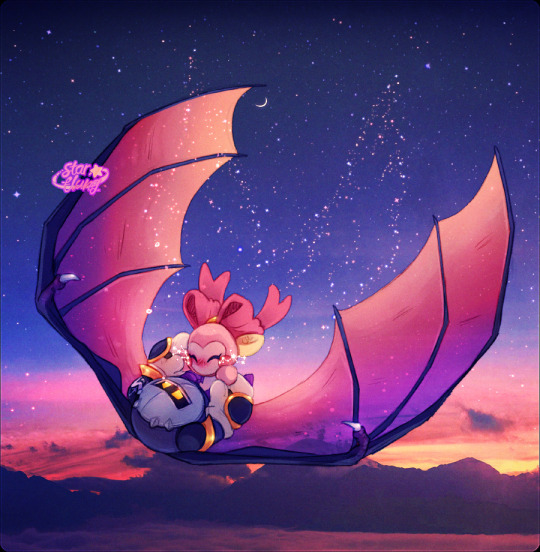
✧˖°.✧ gravity ✧˖°.✧
ɡravɪti (noun)
1. the force that attracts a body towards the centre of the earth or towards any other physical body having mass
2. the degree of intensity of gravity, measured by acceleration
3. extreme importance; seriousness
4. solemnity of manner
#🎀💖#🎀🔍#meta knight#starstruck dee#my art#“might be funny” i agree!! and yet!! somehow i took it deadly serious!! uhhh..... sorry#wrapping up the month with the most popular prompt. they were tied then meta knight overtook sailor dee right at the end#(i guess coz i did sailor's earlier?) i'll still be doing others but i'm obviously a bit behind schedule sorry!#uhm.... haha.#bit of a ribbonemoji workout on this one.#i'm too attached to the pretentiousness of my caption (🔍🔍🔍) to add this to the main post & i'll come back to this later...#but in my worldbuilding Celestials have a behaviour called Sky Dancing. looks a lot like this. bird understanders pspspsps. iykyk#and as always: “is this one canon?” HHHHMMRR. i'm not sure yet. can i say that? i'm still deciding. this one is imo most feasible#at least as something with any actual Romantic Coding. has the kind of rivals > friends > lovers plotline as well which is always fun.#but i think they have to be stupid for a long time before they'd get *here*....#and i'm just not sure they'd have the chance before ███████ ██████ █████ ██ ████ ███.
200 notes
·
View notes
Text
The Importance of Amae in My Personal Weatherman
Masterlist || Language Analysis Part 1
I have seen a lot of discourse in the English-speaking fandom surrounding Segasaki's apparent dismissal or trivializing of Yoh's desire to pursue his manga, and most of it is negative. His comments about wanting Yoh to remain dependent on him, or that Yoh does not need to earn money are seen as patronizing or controlling at best and oppressive at worst. It appears that Segasaki does not understand nor respect Yoh's need for independence, and that is what strains their relationship.
But what if I asked you to consider that Segasaki's behaviour is actually an invitation to Yoh to reinforce their relationship? And what if I told you that Yoh's withdrawal from Segasaki constitutes a rejection of that invitation, and it is that rejection that strains their relationship instead?
Of course, the end result is the same - a strained relationship - and in reality there is never one side wholly responsible for this. The point of this is to simply challenge the cultural notion that a successful relationship is the coming together of two equally independent individuals, as opposed to the co-creation of a relationship formed by two interdependent individuals.
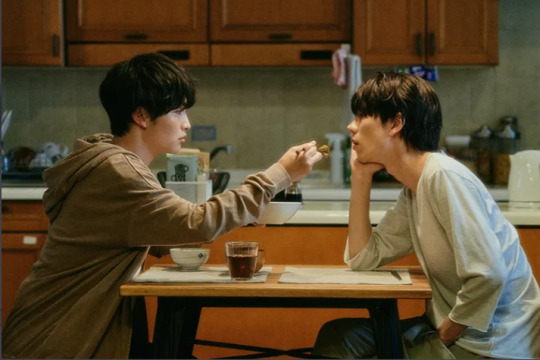
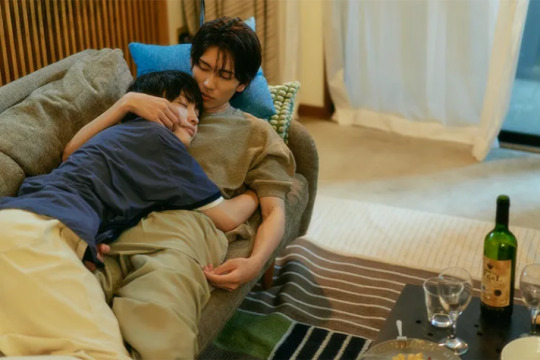
"If only you could stay drunk forever..."
"It's okay to feel down again for me too you know"
- Segasaki, Ep 4, Ep 5
This isn't about Segasaki wanting to keep Yoh is helpless and dependent on him, but about wanting Yoh to be able to be true to his feelings and express his own desire for affection honestly, without having to hide behind "I hate you" or rejection.
Or, let's try and talk about how Segasaki and Yoh reinforce their relationship through the use of amae (featuring a brief mention of tatemae/honne) who am I kidding this is not brief at all
First: Cultural Context
The way people conceptualize and make meaning of the Self differs between Western and East Asian cultures, and this plays into the differences we see in the basis for our self-esteem, the personal attributes that we value, and even what constitutes the behavior of a mature individual. Broadly speaking, Western cultures tend towards the Independent Self Construal (whereby the Self is a distinct entity separate from others) whereas East Asian cultures tend towards Interdependent Self-Construal (whereby the Self is connected to and defined by relationships with others). Thus, in the West, expressing one's individuality is very important for one's self-esteem, and being able to communicate clearly and confidently is valued and a sign of maturity. Conversely, in the East, one's ability to integrate and become a member of the group is prized, and contributes significantly to one's self esteem. In order to be seen as a mature individual, one must learn not only to read a social situation but also how to modify one's behavior in order to respond to the changing demands of that situation, with the ultimate goal being to maintain group harmony.
tl;dr - In East Asian culture, behaviors and attitudes that emphasize interdependence and promote group harmony actually play a big role in reinforcing relationships and one's membership towards the group.
Segasaki is an expert at this - his "public mode" that Yoh refers to actually shows us how good he is at social interactions. This is the Japanese concept of tatemae/honne (crudely translated as public self/private feelings) - which I could link to a bunch of articles for you, but I'm going to suggest you check out this 9 min street interview instead. At 6:41, one of the interviewees comments that another is sunao, or "honest" (we'll cover this later too) and at 6:49 specifically talks about how reading situations is important as an adult. Segasaki reads the room well, but most importantly, he reads Yoh well.
Yoh is not good at this, at all. In Ep 6, we see that he does not integrate well with the group, and he doesn't realize how he might appear to others when he stares and sketches from afar. Yoh does not read the room well because he doesn't pick up on social cues and does not adhere to social norms (I'll point these out in Ep 6's corrections). He cannot read Segasaki, and especially cannot read Segasaki's amae, or his attempts at reinforcing their relationship. Part of this is because his low self-esteem causes him to withdraw from Segasaki's affection as a means of self-protection, and so he valiantly tries to deny his feelings for Segasaki. As Man-san commented in Ep 4, Yoh is not sunao - he has difficulty with being true/honest about his feelings, even to himself.
Sunao is another term that usually pops up when talking about feelings/relationships. It can be used to describe one's relationship with oneself, as well as the relationship with another/group. With oneself, it is usually used to mean "being honest/truthful/straightforward/frank/open-minded about one's feelings". With another person/group, it is usually used to mean "to cooperate/listen/be obedient, or "to be humble/open-minded". In essence, the word encompasses an ideal virtue that is often taught from early childhood - that we should treat both ourselves and others with humility and honesty, because that is how we accept ourselves and stay in harmony with other. This is what becoming an adult, or gaining maturity, means (not gaining independence, as adulthood is often equated to in the West - do you see a running theme here 😂). Of course, that's actually really hard to do, so you'll often hear children (and immature adults too) chided for "not being sunao" (this can therefore sound patronizing if you're not careful). We'll revisit this in a little bit.
Second: What is Amae?
Amae is a key component in Japanese relationships, both intimate and non-intimate. It happens every day, in a variety of different interactions, between a variety of different people. But it is often seen as strange or weird, and those unfamiliar with the concept can feel uncomfortable with it. This stems from the difference in self-construal - because independence is tied so strongly to an individual's self-image in the West, it is very hard to fathom why behavior that emphasizes interdependence could be looked upon favorably. It is telling that every possible English translation of the word "amae" carries a negative connotation, when in Japanese it can be both negative or positive. The original subtitles translated it as "clingy", for example. Other common translations include "dependence", "to act like a child/infant", "to act helpless", "to act spoiled", "coquettish", "seeking indulgence", "being naive" etc.
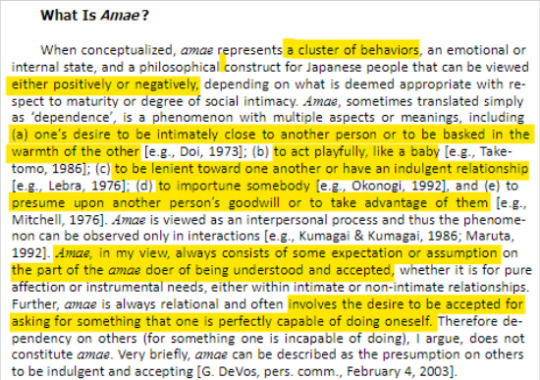
From A Multifaceted View of the Concept of Amae: Reconsidering the Indigenous Japanese Concept of Relatedness by Kazuko Y Behrens
*Note - the word "presumed" or "presumption" or "expectation" or "assumption" used in the above definition and in the rest of this post, can give the impression that all of amae is premeditated, which adds a calculative component to this concept. Whilst amae can indeed be used in a manipulative manner (benign or otherwise), it is not the case for every single situation, and often amae that seeks affection is often spontaneous and without thought, precisely because the situation allows for it to appear organically. This is the amae that Segasaki and Yoh most often exchange - so think of these assumptions and expectations as "unconscious/subconscious" thought processes.
Third: Amae Between Segasaki and Yoh
Yoh shows a lot of amae when he is drunk:


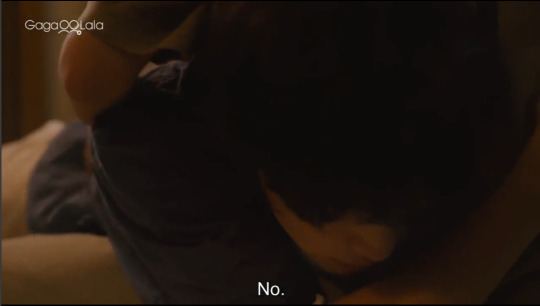
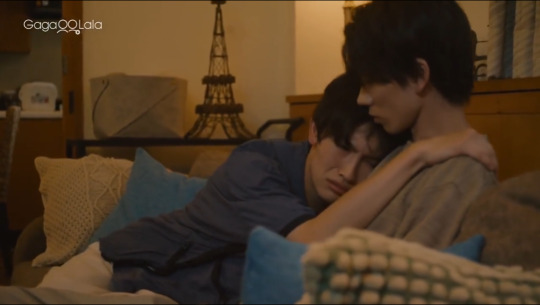
He whines, buries himself into Segasaki's embrace, refuses to move or let go of him, and keeps repeating "no". In these interactions, Yoh wants Segasaki's affection, but instead of asking, he does, well, this, and he presumes that Segasaki will indulge his behavior. Leaving to get some fresh air might not be as obvious - but it is a form of amae as well, because Man-san is his guest, not Segasaki's, and he shouldn't be leaving Segasaki to entertain her. The expectation that this is okay, and that neither of them will fault him for it, is what makes it amae.
Segasaki obviously enjoys indulging Yoh when Yoh does amae, because he recognises this as Yoh's request for affection from him. It's not that Segasaki enjoys Yoh in this drunk, helpless state; it's not even that Segasaki feels reassured by Yoh's requests for affection. Segasaki knows Yoh likes him, and recognizes that Yoh is struggling with those feelings. That Yoh is actually able to do amae to Segasaki is what delights him the most, because it is something that requires a lot of trust in Segasaki and a willingness to be vulnerable in front of him. This is how amae reinforces relationships - when a request for amae is granted, both the giver and the receiver experience pleasant feelings.
That said, an amae request can also be perceived negatively - if amae is excessive, or if the person responding feels they are obligated to do so. In Ep 5, Man-san chides Yoh for his amae - the fact that he expected to do well from the beginning, and became upset when he failed. He told her about his unemployment, presuming that she would comfort him, but alas.
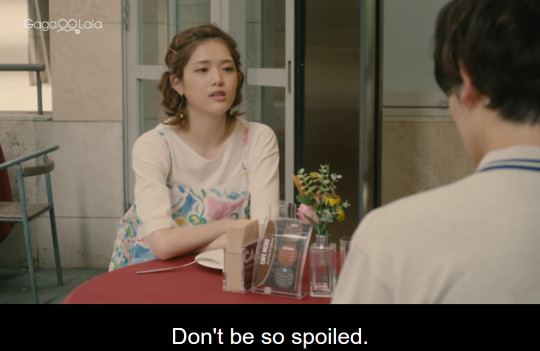
Segasaki also does amae - but unfortunately Yoh misses many of his cues, and so neither of them really gain pleasant feelings from the interaction (ok so maybe Segasaki does, but I will argue that is more because Segasaki also enjoys it when Yoh obeys him - see @lutawolf's posts for the D/s perspective on this!).
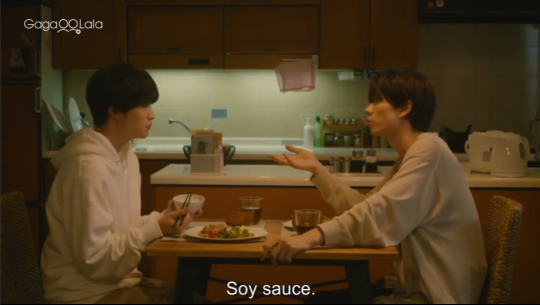


Did you catch it? Segasaki wants Yoh to pass him the Soy Sauce, which, clearly, he is capable of getting himself. He tells Yoh to feed him, because he wants Yoh's affection. And the real kicker - he asked for curry, and expected Yoh to know he wanted pork. In all these interactions, Segasaki presumes that Yoh will indulge him and do for him things he can do himself perfectly well (and even better at that) - this is what makes this amae. But look at Yoh's reactions:

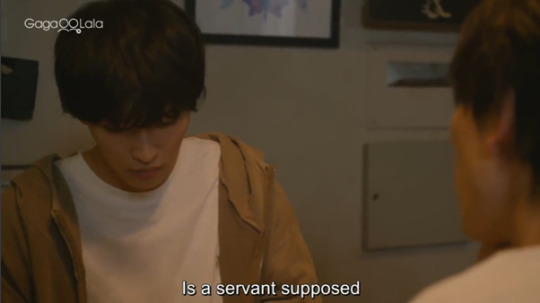
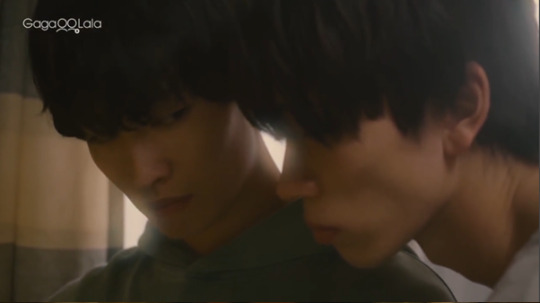
Yoh just stares between the Soy Sauce and Segasaki, between Segasaki and his food, and then just at Segasaki himself. He doesn't recognise any of this as amae, and in the case of feeding Segasaki makes the conclusion that this is somehow a new slave duty he's acquired. And therefore, he does not gain pleasant feelings from it.
In Ep 3 we see a turning point in Yoh's behaviour - his first (sober) attempt at amae (the argument in Ep 2 is debatable - it's not amae from Yoh's POV, but Segasaki responds as if it were, with a head pat and a "when you get drunk, you talk a lot don't you?").
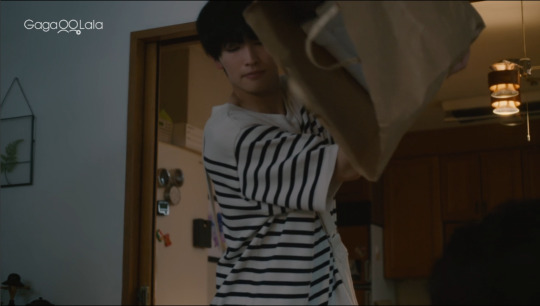
Here, Yoh wants to express his desire for Segasaki's affection, but he can't bring himself to say it aloud. Instead, he dumps bedsheets on Segasaki's lap, as if the bigger the scene he makes the greater the intensity of his desire he can convey. It is the presumption that Segasaki will understand him that makes this amae. And then, we get this:

Not only a happy Segasaki and a sweetly shy Yoh, but also a Yoh who's emboldened by Segasaki's response, and who finally, for the first time, reciprocates touch, and considers the possibility that Segasaki might actually like him.
With every episode, Yoh gets more and more comfortable with doing amae towards Segasaki, because Segasaki picks up on his cues and always responds to them. In Ep 5, Yoh's amae comes out naturally, triggered by the stress of his unemployment, and we see it in all those moments he sounds and acts like a child, and as I mentioned, Segasaki spends the whole episode reassuring Yoh that his amae is welcomed, and that Segasaki likes responding to it. If you've been wondering why the relationship between Segasaki and Yoh can, at times, feel somewhat parental in nature - this is it. It's because Segasaki sees the contradiction between Yoh's childlike insistence that he does not like Segasaki and his desire for Segasaki's attention and affection, for what it really is - Yoh's struggle with accepting himself. When Yoh is able to be sunao, he does amae naturally, and Segasaki responds to him in kind.
Now, all we need is for Yoh to recognize when Segasaki does amae, which will likely happen soon, given that Yoh has grown with every episode.
As always, thank you for reading :))
#my personal weatherman#taikan yohou#体感予報#segasaki x yoh#MPW language analysis#sociolinguistics#japanese language#japanese cultural tidbits#mytranslations#MPW subtitle corrections#my meta is creeping into my sub corrections#need to get it out here instead#sorry for the length#tbh posting such crazy long posts and expecting that people will actually read it#can be considered amae too 🤣🤣#Ep 6 corrections will be out next#I just needed to get this out before 7#and i sorta made it
433 notes
·
View notes
Text
Hawkeye and Frank are the two most diametrically opposed characters on Mash. They clash politically, ideologically, emotionally, intellectually, and even physically on more than one occasion. There is virtually nothing they agree on. But they do have one significant similarity: both Hawkeye and Frank are notably, pointedly effeminate.
Hawkeye is the central protagonist, so he's written to be likeable, even admirable, especially in the first five seasons of the show when satire dominated rather than character drama. He's the character who makes the correct political points and voices the show's ideology, and male audience members are encouraged to identify with him and aspire to be like him. He's witty, he's smart, he's charismatic, he dodges consequences a lot, he's highly skilled in his work, and he has a strong personality and natural leadership qualities.
Frank is the main antagonist up until the end of season five. He's written for audiences to hate him, mock him, and occasionally be horrified by him. He's dull-witted, incompetent, awkward, easily led and manipulated, and always gets his comeuppance. Few audience members are likely to aspire to be more like Frank Burns.
And yet, while most likeable protagonist/detestable antagonist duos in American popular media would also be differentiated in terms of gender performance as a matter of course - the effeminate villain being a standard stock character, always set against a ruggedly masculine hero - Mash takes a different approach.
From his core personality as a sniveling, weak-willed follower, to the way other characters, including Hawkeye, routinely make fun of him by comparing him to a woman or insinuating that he's gay, Frank Burns certainly fits the part of weak, emasculated villain. What's more interesting, and much less commonly seen in Hollywood media, is that Hawkeye is portrayed as just as unmanly, and just as, if not more prone to having it pointed out in the show.
Often Hawkeye's jokes at Frank's expense include the implication that Hawkeye is attracted to him himself, and not necessarily as "the man." He jokes, "Guess it's a marriage, Frank. I know I can do better, but at my age, can I wait?" in Hawkeye, Get Your Gun; he switches from calling Frank one of his vampire brides to taking the feminine part in post-coital pillow talk after siphoning his blood in Germ Warfare; he kisses or tells Frank to kiss him in Major Fred C. Dobbs, For the Good of the Outfit, and Bulletin Board, etc.
Other times, the jokes Hawkeye makes about himself are virtually identical to the jokes made at Frank's expense - their respective attractions to Margaret as a potentially dominant sexual partner, eg, with both Frank and Hawkeye portrayed as eagerly submissive. For instance, in 5 O'Clock Charlie Hawkeye jokes about tying Frank to Margaret's tent, then dismisses the thought with, "He'd probably love it. I know I would." And Hawkeye/Trapper and Frank/Margaret are sometimes paralleled as dual couples, Hawkeye and Frank usually being framed as the more feminine partner in each.
And of course, unconnected to Frank, there are many, many more examples of Hawkeye's effeminacy, both in jokes and in personality traits.
Hawkeye is a self-professed coward who is loud and proud about how terrified he is to be stuck in a war zone. He's emotionally open and highly empathetic, always willing to listen to others' problems and discuss (or scream about) his own. He abhors institutional violence and faces every enemy combatant with his hands firmly in the air. When authority is thrust upon him he strives to relinquish it, and uses it as little as possible.
More shallowly, he has little interest in sports and exercise, derides masculine hobby magazines like Field and Stream and Popular Mechanics, is incapable of performing mechanical tasks to the exasperation of others at least four times (Comrades in Arms which explicitly frames this emasculating, In Love and War, Patent 4077, and Hey, Look Me Over), mocks traditional masculinity in many ways, and enjoys musical theatre and Hollywood gossip. And he makes and takes literally hundreds of jokes about being unmanly and having sex with men himself, many more than he makes at Frank's expense.
But while the jokes are at Frank's expense and meant to belittle him, they're rarely made at Hawkeye's expense, especially in the first five seasons. Hawkeye doesn't make the jokes out of self-deprecation, he makes them out of pride and a desire to differentiate himself from the army men he's surrounded by. He's almost always in on the jokes others make about him, rather than offended - Potter telling him to file a paternity suit against his rival in Hepatitis makes him laugh delightedly, and Trapper's remarks on his effeminacy, such as Miz Hawkeye in Hot Lips and Empty Arms, are sometimes lightly teasing but always a regular aspect of their dynamic that Hawkeye enjoys playing up. Frank doesn't make any jokes directly mocking Hawkeye's masculinity that I can recall, beyond vague "pervert" and "degenerate" remarks, which, while often historically homophobic, in the show's context tend to be treated as a reference to his heterosexual endeavours.
Frank's effeminacy is a point of mockery and derision, but Hawkeye's is a point of pride, and not intended to make him any less likeable to an audience. Antagonists don't get to score points off of Hawkeye by mocking his feminine traits, but Hawkeye makes fun of Frank regularly by mocking his feminine traits.
This difference in framing can partially be explained by the nature of their respective gender performances.
While Hawkeye and Frank are both effeminate, they're effeminate in many opposite ways. Frank is weak-willed while Hawkeye is strong-willed. Frank is unappealing to most women, while Hawkeye is something of a lady's man. Frank cannot face his fears to rise to a challenge, but Hawkeye can. But on the flipside, Frank refuses to admit to fear while Hawkeye openly proclaims it. Frank strives to attain authority while Hawkeye refuses it or takes it on only begrudgingly. Frank is obsessed with guns to a freudian extent while one of Hawkeye's most famous monologues of the show is a speech about refusing to carry one. Frank worships the concept of traditional masculinity even while he can't perform it himself, while Hawkeye mocks the concept and would refuse to perform it even if he could.
The Sniper is an excellent case study of these contrasts. In this episode, Hawkeye is effeminate and at ease with it, while Frank is desperate to prove himself masculine. Frank and Margaret flirt with strong Freudian overtones while Frank shoots a gun while nearby Hawkeye flirts with with a nurse with a line about "tasting" her. Hawkeye connects with the nurse he's wooing by relating to how scared she is and huddling in fear with her, while Margaret demands that Frank prove his masculinity by going out and taking down the sniper himself. Frank carries a gun while trying to approach the sniper, while Hawkeye carries a white flag. Frank tries to make fun of Hawkeye for wanting to surrender, but he can't bring himself to approach the sniper while Hawkeye does.
This contrast of gender performance is a consistent aspect of Hawkeye and Frank's dynamic throughout the show, but The Sniper makes it a central theme so it's a useful example to show how their relationships to masculinity are a deliberate aspect of their dynamic.
And while Hawkeye makes fun of Frank's femininity, it's significant that he also regularly makes fun of Frank's masculinity - his love of guns (eg The Sniper), his sexual affairs (eg the exchange about Frank as a "fantastic performer" in Yankee Doodle Doctor), his numerous attempts to exert authority (eg Welcome to Korea), his desire for socially approved success (eg Hot Lips and Empty Arms), etc.
Both masculine and feminine sides of Frank are comprised of negative character traits, while Hawkeye embodies the best of both - emotional expression and healthy ways of coping by talking about his feelings; bravery but not machismo; intelligence and skill as a doctor rather than an officer; empathy and a willingness to listen; sexual prowess but largely through his love of foreplay rather than his dick game (which, in the context of the early 70s, is a somewhat feminine attribute that distinguishes him from a typical traditionally masculine man); etc.
Hawkeye demonstrates some of the most appealing and healthy qualities of both masculinity and femininity while Frank demonstrates, or strives to demonstrate, the more toxic qualities of both. Through including a few positive masculine traits in the mix, the narrative is able to depict Hawkeye as likeable, admirable, and desirable in his effeminacy while Frank is depicted as loathesome in his. Hawkeye gets one of many, many women in The Sniper by showing vulnerability, while Frank only appeals to Margaret, and Margaret is portrayed as borderline pathological in her sexual attraction to violent masculinity (the scene where Frank excites her with his gun, for example, also includes an electra complex joke, and there's a running rape kink gag in this episode as well).
Another aspect to consider when it comes to differentiating Hawkeye and Frank's respective femininities is hypocrisy. Similar to how Frank and Margaret's affair is mocked because they can't admit to it while Hawkeye and Trapper's affairs are glorified, part of what makes Frank's effeminacy so mock-worthy, while Hawkeye's feminine qualities are a source of pride and rebellion, is that Frank refuses to admit to them.
Frank desperately wants to be the ideal heroic army man and often play-acts the part, poorly. When Hawkeye mocks him by calling him a woman, for example, he's drawing attention to Frank's failure to live up to his own ideals. And when Hawkeye calls himself a woman, he's mocking those same ideals. The message is that Frank is pathetic not so much for failing to be traditionally masculine, but for wanting to be traditionally masculine at all.
Ultimately the ways Hawkeye and Frank perform masculinity and femininity are pointedly in opposition, from which masc and fem traits they embody, to how proudly they embody them. The show itself draws attention to these gendered similarities and differences between Frank and Hawkeye through a constant barrage of jokes, and even whole scenes and episodes. In this way the show portrays Frank as a hypocritical loser who wants to be masculine but fails to embody all but the worst traits, and Hawkeye as a cool, admirable guy who disdains the traditional pillars of masculinity and embraces his own effeminacy.
#mash#marley on mash#mash gen#mash gs#frank mash#hawkeye mash#since you guys liked that trapper gender meta a lot more than i thought you would here have another one#though this is written a little less formally lol#i have more examples of whole scenes that make these comparisons than just the sniper but i'm trying to keep this from being#even longer than it already is#but eg white gold is another good example wrt how they relate to flagg; yankee doodle doctor; army navy game; george; the gun; etc etc#(also it's interesting that when frank leaves hawkeye gets the pathetic loser portrayal more often... though i think that's a coincidence#the shift from early to late mash could be yet another essay on mash and gender lol)#long post
240 notes
·
View notes
Text
If you know anything about the Black Death, it's actually no mystery why Hob Gadling, who lost half his village to the Plague, would choose life even under the most miserable of conditions over any afterlife devised by the God that allowed that to happen.
#hob gadling#the sandman#sandman meta#I HAVE MORE FEELINGS ABOUT THIS LONG POST REBLOG OF THIS COMING but I need to get my thesis statement out there first
3K notes
·
View notes
Text
*deep breath in*
the fears 👏 have always 👏 been (in one way or another) 👏 parallel 👏 to 👏 desire 👏
let me explain.
so many of the statements given by actual avatars center around some sort of need that was met by their entity. Lots of them even had a positive relationship with the fear that drove them.
Jane Prentiss is an excellent example - the Corruption has always been about a form of toxic and possessive love, but she personally has a deep desire to be “fully consumed by what loves her,” and finds a perverse joy and relief at allowing herself to be a home
Jude Perry is another - she fucking loved watching people’s lives be utterly destroyed. The Desolation only offered her a power of destruction on a grander scale, and then gave her a more intense rush of joy as she did its work. When she tells Jon that he needs to feed the Eye before it feeds on him, it’s almost as an afterthought; she was happily feeding the Desolation long before it burned her into a new existence.
Simon Fairchild. Every time that old loose bag of bones wanders into the picture, he is having a fucking EXCELLENT time playing with the Vast. He loves showing people their own insignificance, and he loves luring them into situations where he can throw them into the void as he smiles and waves.
Peter Lukas (hell, the whole Lukas family (except Evan. RIP Evan.)) hated. people. all he wanted was for them all to go away, to leave him alone. The Lonely only fulfilled that desire.
Daisy, Trevor, and Julia, all devoted to hunting those things they deemed monstrous.
Melanie, holding tight to that bullet in her leg because on some level, she wanted it. It felt good, it felt right, it felt like it fit right alongside the anger and spite that drove her to success.
Annabelle Cane first encountered the Web when she was a child, running away from home in order to tug on her parents’ heartstrings in just the right way to have them wrapped around her little finger. Later on she volunteered to be the subject of an ESP study. Hell, she’s the one who dangled the “Is it really You that wants this?” question over Jon’s head in S4.
And that brings us to Jon, beloved Jarchivist, the Voice that Opened the Door. Ever since he was a child targeted by the Web, he was looking for answers. He joined the Magnus Institute’s Research Department looking for them, he stalked his coworkers in search for them, he broke into Gertrude’s flat and laptop out of desperation for them. And when he realized that all he had to do was Ask to get truthful answers to his questions? It was only natural for him to jump at that opportunity.
Elias told S3 Jon that he did want this, that he chose it, that at every crossroads he kept pushing onwards, and the inner turmoil that caused was one of the focal points for Jon’s character through the rest of the podcast.
There’s a certain line of thinking in many circles about the power of the Devil: he’s not able to create anything new. All he’s able to do is twist and warp that which was already present, making it something ugly and profane while still maintaining the facade of something desirable.
Jon didn’t choose the Eye. But he did wander into its realm of power, exhibiting exactly the qualities it was most capable of hijacking and warping to its own ends. Jon didn’t choose the Apocalypse. But Jonah picked at him little by little, pointing him towards each Fear individually. Jon didn’t want to release the Fears. But the Web tugged on his strings just so and laid a pretty trail for him to follow until he reached its desired conclusion.
Jon didn’t choose ultimate power, or omniscience, or even his own role as Head Archivist. But he said “yes” to the right (wrong?) orders and kept on pushing for the right (wrong?) answers. He wanted to succeed at the work he had been assigned. He wanted to protect his friends. He wanted to rescue them when they were lost. He wanted to prevent the apocalypse, to save the world. He wanted to know why he was still alive, when so many had died right in front of him.
The Great Wheel of Evil Color that is the Entities might not fit as neatly into categories in this universe - maybe there was no Robert Smirke trying to impose strict categories on emotional experiences, or maybe the ways they manifest in the world has turned on its head (goodness knows many of them have been showcased and blended in some very fun and new and horrifying ways so far) - but their fundamental foundations seem to be the same. Hell, in episode one we learned that there had been enough individual incidents to create a distinction between “dolls, watching” and “dolls, human skin.”
Smirke’s Fourteen isn’t going to be relevant as common parlance, RQ said that already, but I don’t think that means the Fears themselves (and their Dream Logic-based rules) are different - I think it means that the levels of understanding, language used, and personal connections among people “in the know” are going to be entirely unfamiliar
#tma#tmagp#the magnus protocol#tmagp meta#tmagp analysis#the entities#robert smirke#smirke's fourteen#mind write a meta post that doesn’t turn into a fucking essay challenge#I literally thought about citing my episode sources here but decided that would get too FUCKING long.#anyway I’m pulling mostly from Gerry’s statement (111) and#and the Big Elias Group Confrontation (92)#and Annabelle’s statement (147)#and then finale - 196 / 197 / 200#there are other little lines that I grabbed - tbh feel free to ask about anything I’ve said bc I feel like I’m ready to defend a thesis#I’ve been thinking about this on and off for a few weeks since the desire thing started going around#I have an obsession with Themes as they relate to Worldbuilding and now I have subjected you all to it as well#I am serious tho if anyone wants me to pull the specific parts I’m talking about (whether cuz you have Questions or you wanna ref them too)#lmk#my hyperfocus on silly media brain might as well come in useful somehow#aight peace ✌️
212 notes
·
View notes